Unit 2 English around the world单元课件(137张)
文档属性
| 名称 | Unit 2 English around the world单元课件(137张) | 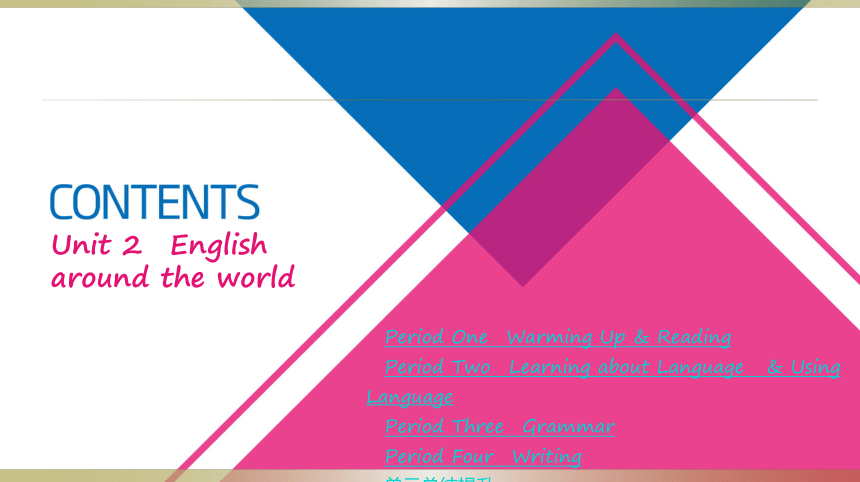 | |
| 格式 | zip | ||
| 文件大小 | 1.2MB | ||
| 资源类型 | 教案 | ||
| 版本资源 | 人教版(新课程标准) | ||
| 科目 | 英语 | ||
| 更新时间 | 2019-07-07 07:35:54 | ||
图片预览

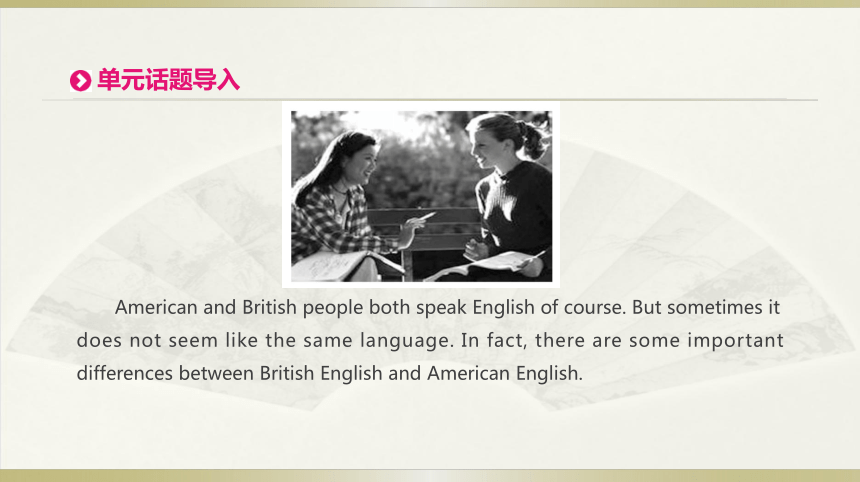
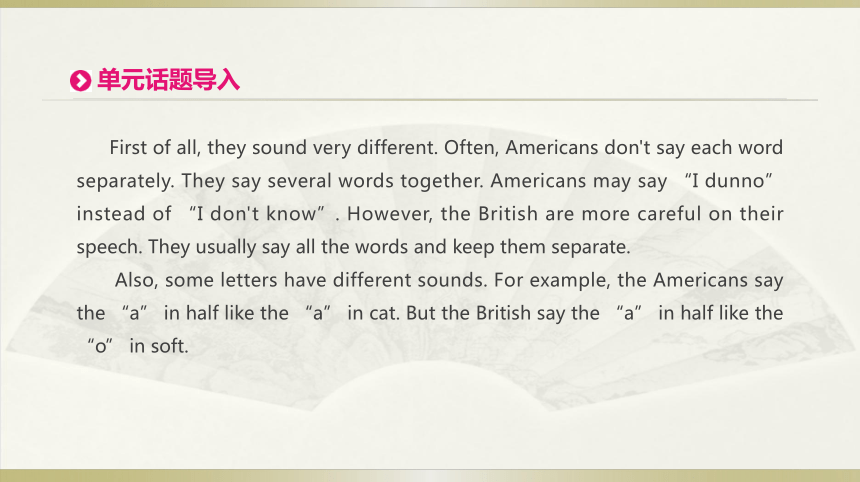
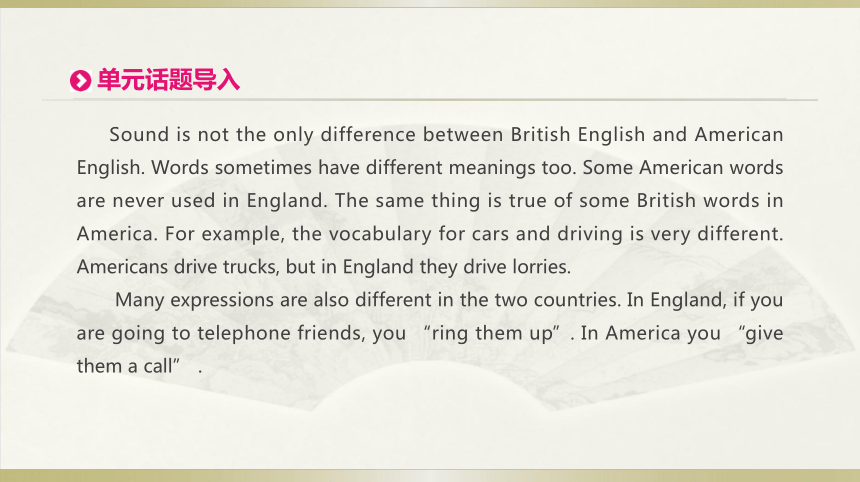
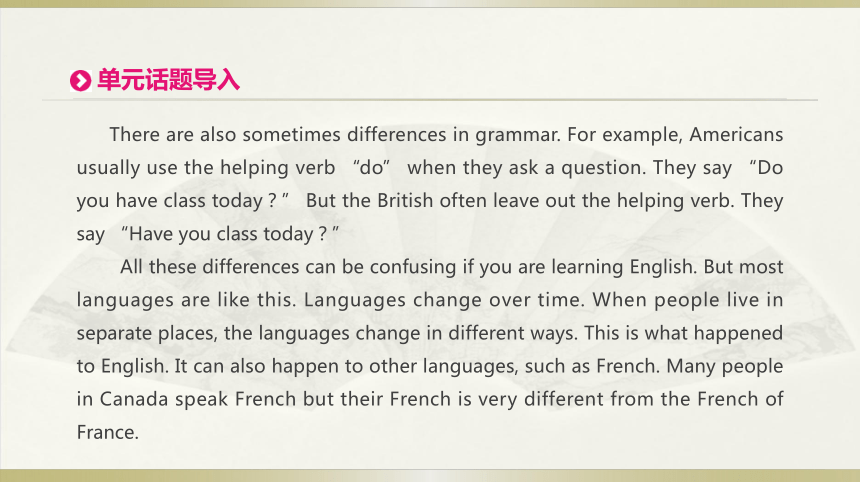
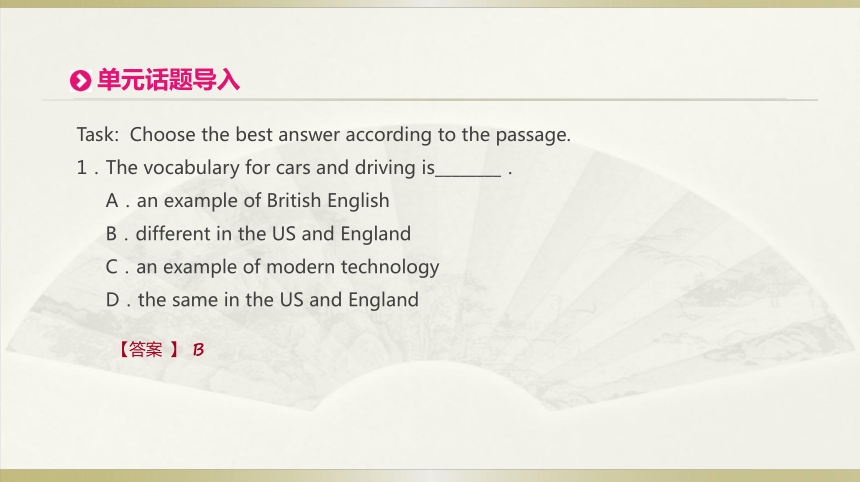
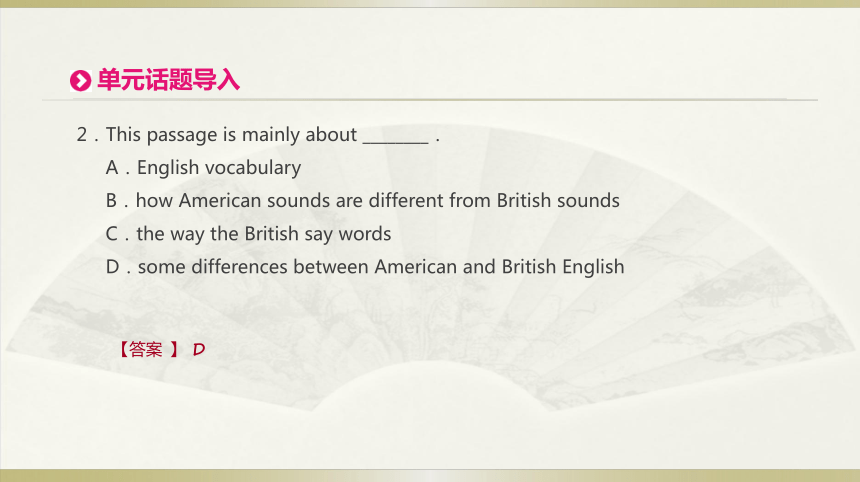
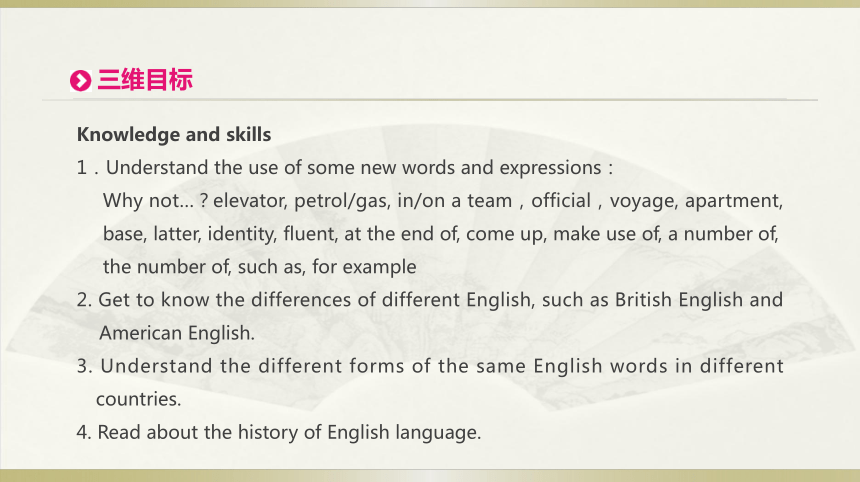
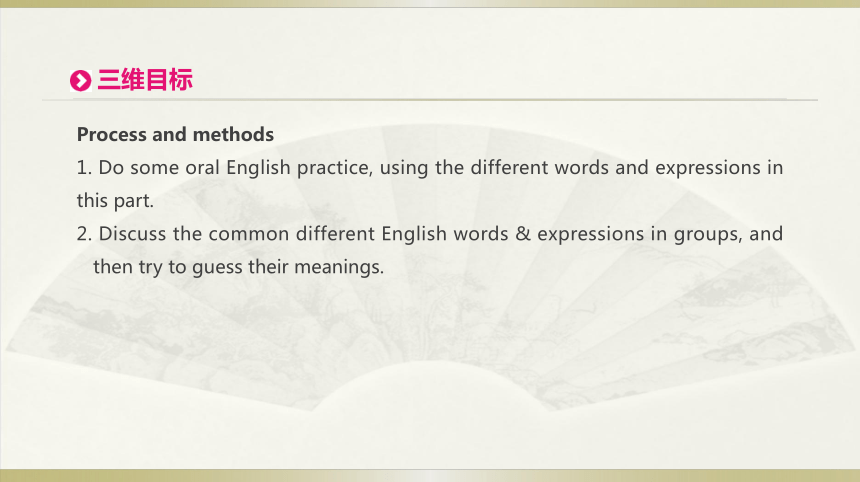
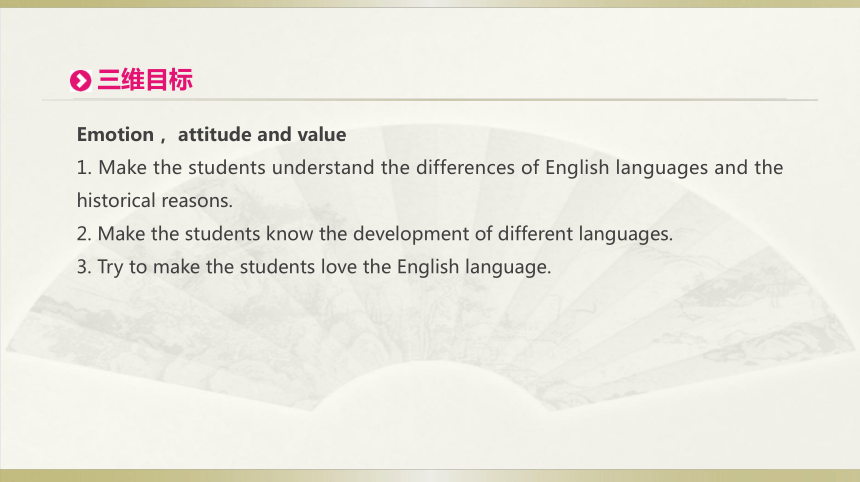
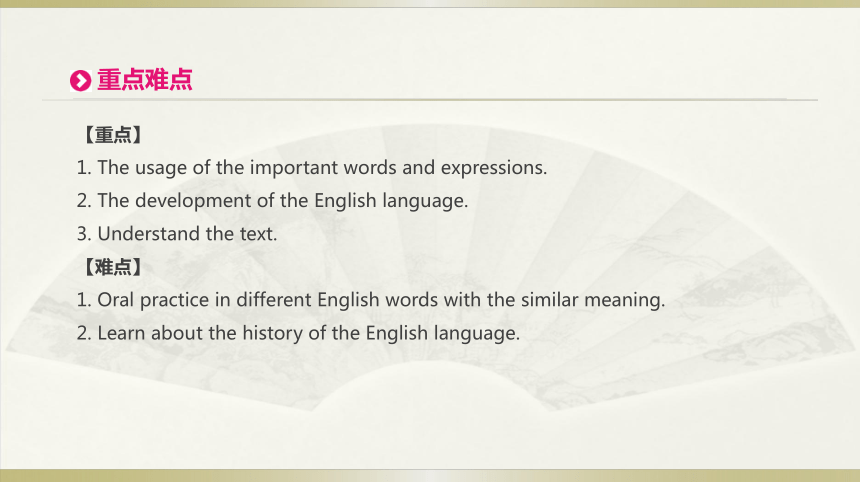
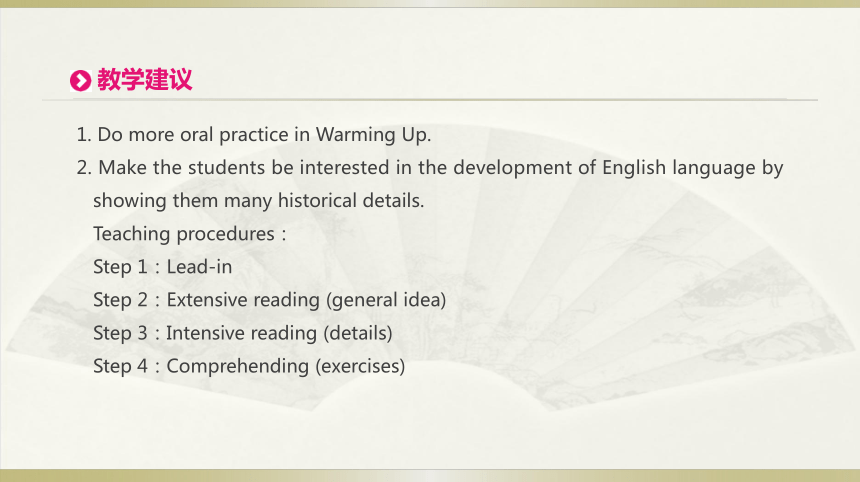
文档简介
Unit 2 English around the world
Period One Warming Up & Reading
Period Two Learning about Language & Using Language
Period Three Grammar
Period Four Writing
单元总结提升
American and British people both speak English of course. But sometimes it does not seem like the same language. In fact, there are some important differences between British English and American English.
单元话题导入
First of all, they sound very different. Often, Americans don't say each word separately. They say several words together. Americans may say “I dunno” instead of “I don't know”. However, the British are more careful on their speech. They usually say all the words and keep them separate.
Also, some letters have different sounds. For example, the Americans say the “a” in half like the “a” in cat. But the British say the “a” in half like the “o” in soft.
单元话题导入
Sound is not the only difference between British English and American English. Words sometimes have different meanings too. Some American words are never used in England. The same thing is true of some British words in America. For example, the vocabulary for cars and driving is very different. Americans drive trucks, but in England they drive lorries.
Many expressions are also different in the two countries. In England, if you are going to telephone friends, you “ring them up”. In America you “give them a call”.
单元话题导入
There are also sometimes differences in grammar. For example, Americans usually use the helping verb “do” when they ask a question. They say “Do you have class today?” But the British often leave out the helping verb. They say “Have you class today?”
All these differences can be confusing if you are learning English. But most languages are like this. Languages change over time. When people live in separate places, the languages change in different ways. This is what happened to English. It can also happen to other languages, such as French. Many people in Canada speak French but their French is very different from the French of France.
单元话题导入
Task: Choose the best answer according to the passage.
1.The vocabulary for cars and driving is________.
A.an example of British English
B.different in the US and England
C.an example of modern technology
D.the same in the US and England
单元话题导入
【答案 】 B
2.This passage is mainly about ________.
A.English vocabulary
B.how American sounds are different from British sounds
C.the way the British say words
D.some differences between American and British English
单元话题导入
【答案 】 D
三维目标
Knowledge and skills
1.Understand the use of some new words and expressions:
Why not…?elevator, petrol/gas, in/on a team,official,voyage, apartment, base, latter, identity, fluent, at the end of, come up, make use of, a number of, the number of, such as, for example
2. Get to know the differences of different English, such as British English and American English.
3. Understand the different forms of the same English words in different countries.
4. Read about the history of English language.
三维目标
Process and methods
1. Do some oral English practice, using the different words and expressions in this part.
2. Discuss the common different English words & expressions in groups, and then try to guess their meanings.
三维目标
Emotion, attitude and value
1. Make the students understand the differences of English languages and the historical reasons.
2. Make the students know the development of different languages.
3. Try to make the students love the English language.
重点难点
【重点】
1. The usage of the important words and expressions.
2. The development of the English language.
3. Understand the text.
【难点】
1. Oral practice in different English words with the similar meaning.
2. Learn about the history of the English language.
教学建议
1. Do more oral practice in Warming Up.
2. Make the students be interested in the development of English language by showing them many historical details.
Teaching procedures:
Step 1:Lead?in
Step 2:Extensive reading (general idea)
Step 3:Intensive reading (details)
Step 4:Comprehending (exercises)
新课导入
【导入一】
Give some examples about the differences between American English and British English.
新课导入
【导入二】
Ask the students to speak out the kinds of the Chinese language in order to show that almost all the languages have various kinds. Instruct them to analyse the reasons of the differences in language.
课前自主预习
Task One:Fast Reading
Ⅰ. Scan the text to find the main idea of the text.
The text mainly tells us the _________________ of the ________ language.
Ⅱ. Scan the text to find a topic sentence for each paragraph.
( )1.Para. 1 A.The example of the difference between different native English speakers.
( )2.Para. 2 B.The wide use of English.
( )3.Para. 3 C.English is a language spoken all around the world.
( )4.Para. 4 D.Why English has changed over time.
( )5.Para. 5 E.English was settled.
development
B
A
D
English
E
C
课前自主预习
Task Two:Careful Reading
Ⅰ. Read the text carefully and judge the following true (T) or false (F).
1. English had the most speakers in the 17th century. ( )
2. English developed when new settlers and rulers came to England. ( )
3. The language for government is always the language of the country. ( )
4. English was one of the official languages used in India. ( )
5. This reading describes the development of the English language. ( )
F
T
F
T
T
课前自主预习
Ⅱ.Read the text carefully and then choose the best answer according to the text.
1.English began to be spoken in many other countries because ________.
A.people from England occupied other parts of the world
B.people in other countries wanted to learn it
C.English was liked by people from other countries
D.English people made people from other countries speak it
【答案 】 A
课前自主预习
2.Which of the following is TRUE according to the text?
A.People who don't speak the same kind of English can't understand each other.
B.English has not changed and developed over time.
C.Fewer and fewer people speak English as their second language today.
D.English now is spoken as a foreign or second language in South Asia.
【答案 】 D
课前自主预习
3.Who moved to America and then Australia?
A.German settlers. B.French settlers.
C.British settlers. D.Danish settlers.
【答案 】 C
课前自主预习
4.When was the English language finally settled?
A.By the 19th century.
B.By the 18th century.
C.By the 1600's.
D.At the end of the 17th century.
【答案 】 A
课前自主预习
5.We can learn from the text that ________.
A.English is not spoken in Singapore and Malaysia
B.China has the largest number of English learners
C.Chinese English may develop its own identity
D.English became the language for education in the 1600's in India
【答案 】 C
课前自主预习
Task Three:Micro?writing
Read the text carefully and fill in the following blanks.
Why has English changed over time? Actually all languages change and develop 1.________ cultures meet and communicate with each other. At first the English 2.________ (speak) in England between about AD 450 and 1150 was very different from the English spoken today. It was based more on German 3.________ the English we speak at present. Then 4.________ (gradual) between about AD 800 and 1150,English 5.________ (become) less like German
when
than
spoken
gradually
became
课前自主预习
because those 6.________ ruled England spoke first Danish and 7.________ (late) French. These new settlers enriched the English language and especially its vocabulary. So by the 1600's Shakespeare was able to make use 8.________ a wider vocabulary than ever before. In 1620 some British 9.________ (settle) moved to America. Later in the 18th century some British people 10.________ (take) to Australia too. English began to be spoken in both countries.
who
later
of
settlers
were taken
1 native adj. 本国的;本地的;与生俱来的 n.本地人;本国人;本地的动物或植物
(教材P10) Native English speakers can understand each other even if they don't speak the same kind of English.以英语作为母语的人,即使他们所讲的英语不尽相同,也可以相互理解。
课堂互动探究
词汇点睛
be native to… 产于……
a native of… 是……的本地人
【活学活用】
(1)She spoke not only her native language, Swedish, but also English and French…
她不仅讲自己的母语——瑞典语,还讲英语和法语……
(2)You can always tell the difference between the tourists and the natives.
游客与当地人之间的区别总是一看便知。
(3)The stranger, a native of the little town, had just returned after twelve years in the inland country.
那个陌生人是这个小镇的本地人,在内陆国家居住了十二年之后刚刚回来。
课堂互动探究
(4)This plant which flowers in spring is also native ______________ Britain, especially in the eastern parts.
这种春天开花的植物也产于英国,特别是东部地区。
(5)You speak English very ________________! How can you make it?
你的英语很地道啊!你是怎么做到的呢?
课堂互动探究
to
natively
2 base vt. 以……为根据 n.基部;基地;基础
(教材P10) It was based more on German than the English we speak at present. 当时的英语更多的是以德语为基础,而我们今天所说的英语不是。
课堂互动探究
(1)base…on… 以……为基础
be based on/upon 以……为基础/依据
(2)on the basis of=based on 根据;基于……
【活学活用】
(1)When they arrived at their destination,the explorers set up a base at the foot of the mountain.
当他们到达目的地后,探险者们在山脚下建立了基地。
(2)The scientist didn't realise that he had based all his statements on a false theory.
这位科学家没有意识到他所有的论断都基于一个错误的理论。
(3)The theory he put up was based on his many years' research, so it was practical.
他提出的理论是以他多年的研究为依据的,因此是切实可行的。
课堂互动探究
(4)It is said that he bases the novel on his travels in India a few years ago.
=It is said that the novel ______________ his travels in India a few years ago.
据说,这部小说是根据他几年前的印度之行写的。
(5)Based on (=On the ________of) these theories the president worked out his picture of the state of the future.
根据这些理论,总统制订出了国家未来的蓝图。
课堂互动探究
is based on
basis
3 latter adj. 较后的;后半的;(两者中)后者的
(教材P10)The latter gave a separate identity to American English spelling.后者形成了美国英语拼写的不同特色。
课堂互动探究
the former…and the latter… 前者……后者……
later adv. 后来
latest adj. 最新的,最近的
lately adv.(=recently) 最近,近来
【活学活用】
(1)In the latter years of his life the great writer lived alone and never welcomed visitors.
这位伟大的作家晚年独居,从不欢迎来访者。
(2)Mary tried to pick a quarrel with her husband, but the latter just ignored her.
玛丽想找碴儿跟她丈夫吵一架,但她丈夫就是不理睬她。
(3)Jane and Mary are good friends; the former is a teacher, and the latter is a nurse.
简和玛丽是好朋友,前者是老师,后者是护士。
课堂互动探究
(4)选词填空(latter/later/latest/lately)
①It has been very cold ________but it is beginning to get a bit warmer.
②If I had to make a decision, I would choose the former over the ________.
③She said in her last letter that she was satisfied with her ________boyfriend.
④Tom and Mary got married in 1985. Two years ________, they broke up.
课堂互动探究
lately
latter
latest
later
1 because of 因为;由于
(教材P9) Later in the next century,people from England made voyages to conquer other parts of the world and because of that,English began to be spoken in many other countries. 后来,在17世纪英国人开始航海,征服了世界的其他地区。于是,许多别的国家开始说英语了。
课堂互动探究
短语储存
【易混辨析】
because of,because
课堂互动探究
because of 是介词短语,表示原因,后接名词、代词、动名词或what引导的宾语从句,在句中作状语
because 是从属连词,引导原因状语从句,表示主句的原因
【活学活用】
(1)The sports meeting had to be put off because of the heavy rain.
=The sports meeting had to be put off because it rained heavily.
由于下大雨,运动会不得不延期举行。
(2)She was very angry ________we had not invited her to the party.
她非常生气,因为我们没有邀请她参加聚会。
(3)It was ______________her poor health that we did not permit her to go to the countryside.
是因为她身体不好,我们才不许她去乡下。
(4)She wants to be loved for who she is, not __________what she'll do for you.
她希望自己被爱是因为她本身,而不是她能为你做什么。
课堂互动探究
because
because of
because of
2 come up 走近;上来;提出;破土而出;发芽
(教材P10) I'd like to come up to your apartment.我很乐意到你的公寓去。
课堂互动探究
come about 发生
come across (偶然)遇见
come out (照片上)显露;结果是;出版
come to 恢复知觉;共计;达到(某种状态)
come up with 提出
come along 一道来;一起去;进步
【巧学助记】
[温馨提示] come up在指“问题、建议或方案等被提出”时,为不及物动词短语,其主语通常为物,无被动语态;come up with则意为“提出……”,为及物动词短语,主语通常为人,宾语则为表示建议、计划、方案等的名词。
课堂互动探究
【活学活用】
(1)He came up and introduced himself when we first met.
我们第一次见面时,他走上前来并做了自我介绍。(走近;靠近)
(2)The moon was still hanging in the western sky when the sun came up.
太阳升起的时候,月亮仍挂在西边的天空中。(升起)
(3)The seeds I sowed last week haven't come up yet.
上星期我播下的种子还没有发芽。(长出,发芽)
(4)I'll let you know ahead of time if anything comes up.
如果发生什么事的话,我会提前让你知道的。(发生;出现)
课堂互动探究
(5)His name came up (=was come up with) whenever the matter of nuclear energy was discussed.
每当讨论核能问题时,人们总会提及他的名字。(被提及)
(6)用come短语的适当形式填空
①When this masterpiece(巨著) ____________, nobody cared for it.
②The housing problems ____________ at the meeting once again.
③On her way home Sara ____________ an old friend of hers.
课堂互动探究
came across
came out
came up
3 at present 目前,现在
(教材P10) It was based more on German than the English we speak at present. 当时的英语更多的是以德语为基础,而我们今天所说的英语不是。
课堂互动探究
be present at 出席
at the present time=at present 目前;现在
for the present 目前;暂时
【活学活用】
(1)The fire almost burned the whole town to the ground. At present, the police are trying to look into the cause of it.
那场大火差不多烧光了整座城镇。目前,警方正在努力调查火灾的起因。
(2)It isn't quite certain whether he will be present at the meeting.
他能否出席会议尚不十分肯定。
(3)He doesn't know how to deal with the difficult situation for the present.
他不知道该怎样应对目前困难的局势。
课堂互动探究
(4)All the people _______________________the meeting were moved by his story.
所有出席会议的人都被他的故事打动了。
(5)Though no one knew it, it was the last time that he ____________________ at the bank.
尽管没人知道,但那是他最后一次到银行上班。
课堂互动探究
had been present
(who were) present at
4 make use of 利用;使用
(教材P10) So by the 1600's Shakespeare was able to make use of a wider vocabulary than ever before.
所以到17世纪,莎士比亚所用的词汇量比以前任何时期都大。
课堂互动探究
(1)make full use of 充分利用
make good use of 好好利用
make little use of 很少利用
make the most of 充分利用
take full advantage of 充分利用
(2)make use of sth to do sth 利用某物做某事
→sth be made use of to do sth 某物被用来做某事
课堂互动探究
[温馨提示] (1)该短语中use前可以用good, full, little等来修饰。
(2)该短语除了直接考查其主、被动形式之外,还常结合定语从句对其进行考查,此时use被提至先行词的位置,然后由含make of的定语从句修饰。如:
This is the best use we made of our spare time.
这是对我们空闲时间的最好利用。
课堂互动探究
【活学活用】
(1)Now that you've got a chance, you might as well make full use of it.
既然你有了这次机会,你不妨充分利用它。
(2)Now most of the students are trying to make the best use of every minute to prepare for the coming exam.
现在,大部分的学生都在努力充分利用每一分钟去准备即将到来的考试。
(3)Morning is the prime time for language learning. Thus, it should________________________.
早晨是学习语言的大好时光,因此应充分利用。
课堂互动探究
be made full use of
(4)__________________________________ my spare time, I would like to be able to use your library facilities.
为了最充分地利用我的空闲时间,我希望能够使用贵图书馆的资源。
(5)The scientists are considering what use can ________________ such a material in the future.
科学家们正在考虑在未来如何利用这种材料。
课堂互动探究
be made of
In order to/To make the best use of
5 a number of 许多的,大量的
(教材P10) For example,India has a very large number of fluent English speakers because Britain ruled India from 1765 to 1947.比如说,印度就有很多人可以说流利的英语,因为英国在1765年到1947年统治过印度。
课堂互动探究
【易混辨析】
a number of,the number of
课堂互动探究
a number of “a number of+可数名词的复数形式”意为“许多的,大量的……”,用作句子的主语时,谓语动词用复数形式
the number of “the number of+可数名词的复数形式”意为“……的数目”,作主语时,谓语动词用单数形式
【活学活用】
(1)It is reported that quite a number of world?famous paintings will be on show in this exhibition.
据报道,将有许多世界名画在本次展览会上展出。
(2)It is reported that the number of wild animals in Africa is decreasing.
据报道,非洲野生动物的数量正在减少。
(3)Up to now,only a small number of schools ____________________ (build) in this area.
到目前为止,这个地区仅仅建了少数几个学校。
课堂互动探究
have been built
(4)As mentioned in the report, there ____________ (be) a number of powerful storms in recent years.
正如报告中提到的那样, 近年来有许多破坏力惊人的暴风雨。
(5)Thanks to the government's efforts, wildlife in this area is well protected now, the number of which __________________ (increase) every year.
由于政府的努力,这个地区的野生动植物现在受到良好的保护,其数量逐年增长。
课堂互动探究
is increasing
have been
1 (教材P10) English is also spoken in Singapore and Malaysia and countries in Africa such as South Africa.新加坡、马来西亚以及像南非一样的非洲国家也说英语。
课堂互动探究
句型透视
句型公式
such as 例如……;像这种的
?【句法分析】
such as“例如……;像这种的”,一般列举同类人或事物中的几个例子,插在被列举的事物与前面的名词之间,不用于句首,后面不跟逗号,不跟句子。
【易混辨析】
such as, for example
课堂互动探究
such as 相当于like,用来列举同类事物,把其后面的名词连接起来。such as不用于句首,后面不跟逗号,不跟句子
for
example 相当于for instance,用来举例说明某一论点或情况,一般只举同类人或物中的一个为例,作插入语,可位于句首、句中或句末
【活学活用】
(1)They planted beautiful flowers such as roses and sunflowers in the garden.
他们在花园里种了些美丽的花,如玫瑰、向日葵。
(2)Many great people rose from poor backgrounds—Lincoln for example. 很多伟人出身贫寒,林肯就是一例。
(3)Some warm?blooded animals,____________ the cat,the dog, or the wolf, don't need to hibernate in winter.
有些恒温动物,如猫、狗、狼,冬天不需要冬眠。
课堂互动探究
such as/like
(4)Some of the European languages come from Latin, ____________ French, Italian, and Spanish.
部分欧洲语言,例如法语、意大利语、西班牙语,都源于拉丁语。
(5)I'll take good care of it.__________________________, when I'm free, I'll play with it, or take it for a walk after supper.
我会好好照顾它,比如说,我有空的时候,我会和它一起玩,或晚饭后带它去散步。
课堂互动探究
such as
For example/instance
2 (教材P10) It was based more on German than the English we speak at present.当时的英语更多的是以德语为基础,而我们今天所说的英语不是。
课堂互动探究
句型公式
more…than…与其说……倒不如说……。
?【句法分析】
more…than…与其说……倒不如说……
(1)“more than+数词”表示“超过,多于”;
(2)“more than+名词”表示“不仅是,不只是”;
(3)“more than+形容词/副词”表示“非常,十分”,与very同义;
(4)more than one表示“不止一个”,接单数名词,作主语时谓语动词用单数形式;
(5)no more than(=only)意为“只有,仅仅”;not more than常用于数词之前,意为“至多,不超过”,其意义相当于at (the) most。
课堂互动探究
【活学活用】
(1)I was more worried than angry when they didn't come home.
他们没有回家时,与其说我在生气倒不如说我在担心。
(2)It took more than building supplies to construct these energy?saving houses. It took brains, too.
建造这些节能住宅不仅仅需要建筑材料,还需要用脑。
(3)He shouldn't have been angry with me for what I said, for it was ________________________ a joke.
他不应该对我说的话感到生气,因为那仅仅是个玩笑而已。
课堂互动探究
nothing/no more than
(4)More than one American soldier ________________ (kill) since the war began almost two years ago.
自从差不多两年以前战争开始后,不止一个美国士兵阵亡。
(5)Hearing this, the boy was ____________________ frightened.
听到这件事,与其说这个男孩害怕了,不如说他很吃惊。
课堂互动探究
has been killed
more surprised than
三维目标
Knowledge and skills
1. Main words and expressions.
2. Improve the comprehending skills of the students by reading the passage.
3. Practise listening and speaking.
三维目标
Process and methods
1. Do Learning about Language exercises on page 11.
2. Learn the new words and expressions first, and then read the whole passage by skimming, scanning, etc.
3. Retell the text after reading.
4. Listen first, and then retell the Listening passage.
Emotion,attitude and value
1. Get the students to know more about English language.
2. Love the world, love our country and love our language.
重点难点
【重点】
1. Understand the general idea and some details of the text.
2. Reading skills.
【难点】
Remember the main words, expressions and sentence patterns.
教学建议
Read the passage in whole, not sentence by sentence.
Teaching procedures
Step 1: Lead?in
Step 2: Retell the text
Step 3: Language points
Step 4: Practice
新课导入
【导入一】
Have a discussion about Chinese English and predict what it will be like in the future.
新课导入
【导入二】
Listening
Listen to some daily English dialogues with different English first, and then ask the students to identify which is American and which is British.
1 command n.& vt. 命令;指令;掌握
(教材P12) Can you find the following command and request from Reading?你能从阅读中找到下列的命令和要求吗?
课堂互动探究
词汇点睛
课堂互动探究
(1)under the command of sb=under sb's command
由某人指挥;由某人控制
be in command of 控制……
be at one's command 听任某人支配
take command of 控制……
have a command of… 了解/掌握……
(2)command sb to do sth 命令某人做某事
command that sb (should) do sth 命令某人应该做某事 (从句用虚拟语气, should可以省略)
【巧学助记】
[温馨提示] command后接that引导的宾语从句时,从句中要用虚拟语气,谓语动词用“should+动词原形”,其中should可以省略。能这样用的动词可以用以下口诀来记忆:一坚持(insist);二命令(command, order);三建议(advise, suggest, propose);四要求(request, require, demand, ask)。
课堂互动探究
【活学活用】
(1)Twelve?year?old girl as she is, she has had a good command of English.
她虽然只是个12岁的女孩,但是她已经熟练掌握了英语。
(2)The teacher commanded students to have everything well prepared in half an hour.
=The teacher commanded that students (should) have everything well prepared in half an hour.
老师命令学生在半小时内把一切都准备好。
(3)The general issued a command that all of them ________________ (come) at six o'clock.
将军颁布了一道命令:他们所有人都要在六点钟到。
课堂互动探究
(should) come
(4)Up to now, the soldiers haven't received any command from the headquarters that they ____________ (start) at once.
到目前为止,战士们还没有收到来自总部的让他们立刻出发的任何命令。
(5)The boss commanded that his workers ________________ (leave) their office before dark.
老板命令他的员工们天黑之前不能离开办公室。
课堂互动探究
(should) start
(should) not leave
2 request n.& vt. 请求;要求
(教材P12) In English you use a command or a request when you want someone to do something.在英语里当你想要某人做某事时,你给人下命令或请求别人。
课堂互动探究
request sb to do sth 要求某人做某事
request that…(should) do 要求……(从句用虚拟语气)
at sb's request=at the request of sb 应某人的请求
make a request for sth 要求得到……
make a request+that从句 做出请求(从句用虚拟语气)
【活学活用】
(1)As the manager refused her request for an increase in salary, his secretary walked out on him.
因为经理拒绝了女秘书加薪的要求,她就离开了他。
(2)At the request of Mayor, the writer made a speech on the square after his book signing.
应市长的要求,这位作家在签字售书之后在广场上做了演讲。
(3)All the students are requested ______________ (attend) the meeting to be held tomorrow on time.
全体同学都要准时参加明天举行的会议。
课堂互动探究
to attend
(4)Workers request that their working conditions ______________________ (improve) as soon as possible.
工人们要求尽快改善他们的工作条件。
(5)All of us made a request that the problem ____________________ (discuss) at the meeting.
我们都提议在会上讨论这个问题。
课堂互动探究
(should) be improved
(should) be discussed
(1)recognize one's voice 辨别出某人的声音
(3)beyond/out of recognition 面目全非;识别不出
3 recognize vt.辨认出;承认;公认
(教材P13) Although many Americans move a lot,they still recognize and understand each other's dialects.虽然许多美国人经常搬迁,但是他们仍然能够辨别、理解彼此的方言。
课堂互动探究
【易混辨析】
recognize,know
课堂互动探究
recognize 指原来很熟悉,经过一段时间的间隔或别的原因后又重新认出来,是终止性动词
know 是延续性动词,指相互间十分熟悉,十分了解
【活学活用】
(1)The moment I answered the phone,I recognized his voice.
我一接电话,就听出了他的声音。
(2)The book is recognized as/to be one of the greatest works of literature of this century.
那本书被公认为是本世纪最伟大的文学作品之一。
(3)Since Darwin's birth, the natural world has changed beyond____________.
从达尔文出生的那天起,自然世界就已经发生了翻天覆地的变化。
课堂互动探究
recognition
(4)He made his face dirty on purpose in order ____________________ by the enemy.
为了不被敌人认出,他故意把脸弄脏。
(5)用recognize和know的适当形式填空
I have ________ him for 10 years. But I didn't ________ him just now because he has changed so much.
我认识他已有10年了。但他变化如此大,我刚才没有认出他来。
课堂互动探究
not to be recognized
known
recognize
4 block vt. 堵塞;阻碍n. 街区;木块;石块
(教材P15) She told us to go around the corner on the left and keep going straight for two blocks.她告诉我们往左边拐弯后直走两个街区。
课堂互动探究
(1)a block of 一大块
(2)block out 挡住,遮住(光线或声音);抹去(不愉快的事)
【活学活用】
(1)He lives three blocks away from here.
他住的地方与此处相隔三条街区。
(2)The thief tried to leave the shop, but the police officer blocked his path.
小偷想离开商店,但是那位警官拦住了他的(逃跑)路线。
(3)The noise from the car blocked out the sound of our voices. 汽车的噪声把我们的说话声盖下去了。
课堂互动探究
(4)After landing, he was unable to leave the airport, because roads into the city ______________.
飞机着陆后,他未能离开机场,因为通往城市的道路被阻塞了。
(5)Over the years she had tried ________________that part of her life.
多年来她努力把她生命中的那一段经历抹去。
课堂互动探究
were blocked
to block out
1 play a part (in) 扮演一个角色;参与
(教材P13) Geography also plays a part in making dialects.地理位置对方言的产生也有影响。
课堂互动探究
短语储存
play a part in=play a role in 在……中扮演一个角色;在……中起作用
take part (in sth) 参加,参与(某事物)
for the most part 整体上;通常;多半
for my part 就我来说
【活学活用】
(1)She plays an active part in all kinds of activities held by the school. 她积极参与学校举行的各种各样的活动。
(2)E?mail as well as mobile phones is playing/plays a more and more important part in our daily life.
电子邮件和移动电话在我们的日常生活中起着越来越重要的作用。
(3)Luck always has a part ______________in any competition but particularly in KO competitions.
运气总是在任何比赛中扮演角色,尤其在拳击比赛中。
课堂互动探究
to play
(4)We've had a few problems, but everything's been fine____________________.
我们有个别问题,但大部分还是挺顺利的。
(5)There is probably a little bit of truth in both arguments.______________, I completely agree with the latter.
两种观点或许都有点儿道理,但是就我来说,我完全同意后者。
课堂互动探究
for the most part
For my part
2 believe it or not 信不信由你
(教材P13) Believe it or not,there is no such thing as standard English. 信不信由你,(世界上)没有什么标准英语。
课堂互动探究
英语中常见的插入语有:
to tell (you) the truth (跟你)说实话
to be honest 老实说
generally speaking 一般而言
judging by/from 从……判断
in other words 换句话说
that is to say 也就是说
【活学活用】
(1) Believe it or not, we were left waiting in the rain for two hours.
信不信由你,我们冒雨一直等了两个小时。
(2)Believe it or not, he is totally different from what he used to be.
信不信由你,他和以前判若两人了。
(3)___________________________________________, I have to improve my English, because my English is not good enough.
说实话,我得提高我的英语了,因为我的英语还不够好。
课堂互动探究
To be honest/To tell (you) the truth
【活学活用】
(4)________________, the weather there is neither too cold in winter nor too hot in summer.
一般来说,那儿的天气冬天不太冷,夏天不太热。
(5)________________ her letter, she seems to be the best person for the job.
从她的信判断,她好像是这项工作的最佳人选。
课堂互动探究
Generally speaking
Judging by/from
1 (教材P13) Believe it or not,there is no such thing as standard English.信不信由你,(世界上)没有什么标准英语。
?
课堂互动探究
句型透视
句型公式
there is no such…as…没有像……的……
【句法分析】
there is no such…as…是固定句式,表示“没有像……的……”,其中的“no such+可数名词单数”相当于“not such a(n)+可数名词单数”。
(1)such与a/an连用时要放在a/an的前面;与all,no,some,any,few,little,many,much,several,one等词连用时,应位于它们的后面。
+that…如此……以至于……
课堂互动探究
【活学活用】
(1)As the saying goes, there is no such thing as a free lunch. If you want something, go and work for it.
常言说,天下没有免费的午餐。如果你想要什么,就得去争取。
(2)There had been several such traffic accidents by the end of last month.
到上个月月底,有过几起这样的交通事故。
(3)The little boy realized that there was ______________ he dreamed of after he got to the museum.
那个小男孩到了博物馆后才意识到那儿没有他所想象的那种玩具。
课堂互动探究
no such toy as
(4)He was ___________________that he was able to work out all the difficult problems.
他是如此聪明的一个学生以至于能解答出所有的难题。
(5)He made ____________________that before long he began to write articles in English for an American newspaper.
他进步非常快,不久就开始用英语给一家美国报纸写文章了。
课堂互动探究
such a clever student
such rapid progress
2 (教材P13)This is because in the early days of radio,those who reported the news were expected to speak excellent English.这是因为在早期的收音机时代,对新闻播音员的要求是讲一口极好的英语。
课堂互动探究
句型公式
This is because…这是因为……
【句法分析】
This is because…意为“这是因为……”,because引导表语从句,表示原因;This is why…意为“这就是……的原因”,why引导表语从句,表示结果。在句式The reason why…is that…中,that引导的表语从句表示原因,不可换成because。
课堂互动探究
【活学活用】
(1)He missed the first bus and that was because he got up late this morning.
他没能赶上早班车,那是因为他今天早上起晚了。
(2)She was ill and that was why she was helped upstairs last night.
她病了,那就是她昨晚要被搀扶着上楼的原因。
(3)The reason why he is late is that there is a breakdown on the railway.
他之所以迟到是因为铁路出了点儿毛病。
课堂互动探究
(4)Mr Park missed his flight this morning, which was ________ he overslept last night.
帕克先生今天早上错过了他的航班,因为他昨晚睡过头了。
(5)The reason ______________ I can't put up with her is ________ she's interested in nothing but shopping.
我不能忍受她的原因是她除了购物以外对什么都不感兴趣。
课堂互动探究
because
why
that
三维目标
Knowledge and skills
1. Main words and expressions:
command, believe it or not, play a part in, recognize, no such thing as…
2. Get the students to understand the definition and the verb forms of the Direct Speech & Indirect Speech.
3. Understand the features of command & request.
4. Make the students master how to change command/request into Indirect Speech.
三维目标
Process and methods
1. Get to know what the Direct Speech and Indirect Speech are, and what their forms are.
2. Practise how to change command/request into Indirect Speech by doing more exercises.
Emotion, attitude and value
1. Understand the mood and the forms of command and request.
2. Know the mood of English sentences.
重点难点
【重点】
1. Direct Speech & Indirect Speech.
2. The features of command and request.
3. How to change imperative sentences into Indirect Speech.
【难点】
1. The features of command and request.
2. How to change imperative sentences into Indirect Speech.
教学建议
1. Try to make the students understand the features of command and request first, and then explain how to change the sentences into Indirect Speech.
2. Do more exercises to strengthen the skills.
Teaching procedures:
Step 1:Lead?in
Step 2:Presentation: command & request
Step 3:Practice
Step 4:Conclusion
新课导入
【导入一】
Revision
Review the forms of Indirect Speech of statements, general questions and special questions. Then, explain the features of command and request to lead to the Indirect Speech of imperative sentences.
新课导入
【导入二】
Definitions
Give the students several examples on request and command. Then ask the students to conclude the features of them..
语法归纳
直接引语和间接引语(Ⅱ)
一、祈使句的直接引语变间接引语
1.引述表示命令的祈使句,常用tell,order转述。如:
“Take down these paintings,”the teacher said to the student. (直接引语,主句谓语为“said to”)
→The teacher told the student to take down those paintings. (间接引语,tell sb to do sth)
[注意] 直接引语中的称呼语一般当作宾语用。
语法归纳
2.引述表示建议、劝告的祈使句,可以用advise,suggest等词转述。如:
The owner said to the workers,“Please take a rest.” (直接引语,主句谓语为“said to”)
→The owner advised the workers to take a rest. (间接引语,advise sb to do sth)
语法归纳
3.引述表示请求的祈使句,常用ask,beg等词转述。如:
“Don’t let your dog bark during the night,please,”the neighbour said to him. (直接引语,主句谓语为“said to”)
→The neighbour asked him not to let his dog bark during the night. (间接引语,ask sb to do)
“Please forgive me,” she said to her father. (直接引语,主句谓语为“said to”)
→She begged her father to forgive her. (间接引语,beg sb to do)
语法归纳
4.引述表示警告或提醒的祈使句用remind,warn等词转述。如:
“Don’t forget to mail the letter,”the wife said to her husband.(直接引语,主句谓语为“said to”)
→The wife reminded her husband not to forget to mail the letter.(间接引语,remind sb to do sth)
[归纳] 祈使句的间接引语形式多采用“动词+宾语+动词不定式”结构;常见的引述动词有ask,tell,beg,warn,remind,advise,order等。
语法归纳
二、直接引语是一般疑问句时的转换规则
若直接引语中的一般疑问句是由表示委婉语气的would,could等构成的疑问句,转换为间接引语时句子的谓语动词常用asked。如:
“Would you please carry the box for me?” she said to the young man.(直接引语为一般疑问句,主句谓语为“said to”)
→She asked the young man to carry the box for her. (间接引语,ask sb to do sth)
语法归纳
[注意] (1)直接引语如果是否定祈使句或否定疑问句,变为间接引语时,要用不定式的否定形式,即not to do…结构。如:
The policeman shouted at the thief, “Don't run away.”
→The policeman ordered the thief not to run away.
(2)祈使句变间接引语时,人称、指示代词、时间、地点状语及直接引语中的时态应根据陈述句的直接引语变间接引语的方法进行相应的改变。如:
“Could you please show me how to send an e?mail?” he asked.
→He asked me to show him how to send an e?mail.
语法归纳
三、直接引语是感叹句时,间接引语可以用what/how/that引导 如: They said, “How lovely the day is!”(直接引语为how引导的感叹句)
→They said how lovely the day was.(间接引语变为how引导的宾语从句)
→They said that it was a lovely day.(间接引语变为that引导的宾语从句)
[注意] 有些感叹句的转述要根据原句的意思采用适当的动词。如:
“ Happy New Year!” he said to me.
→He wished me a happy New Year.
语法归纳
【活学活用】
Ⅰ. 将下列直接引语变成间接引语 (每空一词)
1.Jack said to me, “Don't leave your cellphone in the room.”
→Jack ________ ________ ________ ________ ________ my cellphone in the room.
2.“Please post the letter for me on your way to school,” said my sister.
→My sister________ ________ ________ ________the letter for her on my way to school.
3.“Why not go and ask the teacher for help?” said my mother.
→My mother________ ________ ________ go and ask the teacher for help.
told me not to leave
asked me to post
advised me to
语法归纳
4.Li Ming said, “Let's go to the theatre this evening.”
→Li Ming suggested that ________ ________ ________to the theatre ________ evening.
→Li Ming suggested ________ to the theatre________ evening.
5.“Make sure he does not escape,” the policeman said to me.
→The policeman ________ ________ ________ make sure that________ ________ ________.
they should go
that
going
that
told me to
he didn't
escape
语法归纳
Ⅱ. 单句填空
1. The physics teacher told the boys and girls that light ________(travel) faster than sound.
2. Mary asked me ___________I would go to the concert with her that evening.
3. He said they had insisted that she _____________(start) immediately.
4. She said she______________(nurse) her father in the hospital since she came back.
5. He asked whether my son was going to Shanghai that day ________ the next day.
travels
if/whether
(should) start
had nursed
or
基础写作知识
掌握句子的基本成分,熟悉词性的语法功能(二)
谓语
[基本概念] 谓语用来说明主语的动作、状态和特征,通常由动词的各种形式来充当,并且和主语在人称和数上保持一致。
[谓语与词类的对接] 谓语——1.不及物动词或不及物动词短语; 2. 情态动词+动词原形;3. 及物动词或不及物动词后加介词。
1.不及物动词或不及物动词短语 如:
Time flies.时光飞逝。
Great changes have taken place in our hometown.
我们的家乡发生了巨大变化。
基础写作知识
2.情态动词+动词原形 如:
I can fly and I can touch the sky. 我能飞,我能够着天。
3.及物动词或不及物动词后加介词 如:
I often imagine what my life would be like in the future.
我常常想象我未来的生活会是什么样子。
I will enjoy my work and get along well with my colleagues.
我会喜欢我的工作并且和我的同事相处得很好。
[温馨提示] 凡是涉及谓语动词的问题,一定要注意动词的时态和语态,这是考查谓语动词的核心问题;其次是主谓一致,句子必须遵循主谓一致的原则。
基础写作知识
【及时演练】
根据句意及提示词完成下列句子,注意谓语的不同形式
1.I will ________ (travel) around the world.
我将周游世界。
2. T'ai chi ch'uan ________(call) “shadow?boxing” in English.
太极拳在英语中被称为shadow?boxing。
3. My dream school________(look) like a big garden.
我梦想中的学校看起来像个大花园。
travel
is called
looks
基础写作知识
4.After all, I ___________(make) every effort,and I won't regret.
毕竟,我已经尽力,我不会后悔。
5. This morning her dog ________(start) barking even before 5 o'clock.
今天早上她的狗在5点前就开始汪汪叫了。
have made
started
基础写作知识
表语
[基本概念] 表语用以说明主语的身份、特征和状态,一般位于系动词(如be, become, get, look, grow, turn, seem等)之后。
[表语与词类的对接] 表语——名词、代词、形容词、分词、数词、不定式、动名词、介词短语、副词及表语从句。
1.不定式短语作表语
The purpose of this programme is to develop our interest in English learning and practical abilities in listening and speaking.[陕西卷]
这个项目旨在培养我们英语学习的兴趣和听说的实用能力。
基础写作知识
2.形容词作表语
Whenever I had difficulties, they were always helpful.[湖北卷]
不论何时我遇到困难,他们总是帮助我。
3.名词作表语
What we need most are popular science books.[浙江卷]
我们最需要的是科普书。
基础写作知识
4. 表语从句作表语
That is why I was late for school.
那就是我上学迟到的原因。
5. 介词短语作表语
An exciting event “Innovations on Campus” is around the corner.[辽宁卷]
一个激动人心的“创新校园”活动即将举行。
基础写作知识
【及时演练】
根据句意完成下列句子,注意表语的不同形式
1.In a word, my life will be ____________________(更加丰富) and more colourful.(形容词)
2.Our teacher of English is ____________________(一位美国人).(名词)
3.His job is ____________________(教英语).(不定式)
4.His hobby is ____________________(踢足球).(动名词)
5.The machine must be ______________(出了故障).(介词短语)
much richer
an American
to teach English
playing football
out of order
单元话题写作
如何写海报
【写作点拨】
海报是用来告知广大群众有关戏剧、电影以及球赛等活动的一种带有宣传广告性质的招贴,有的还配以绘画以增加吸引力。海报正中往往把有关内容作为大字标题,如Football Match, Film News等字样,以提示海报的内容。海报无须称呼或注明Poster(海报)等字样。正文部分要写清具体内容、活动时间、地点,以及参加规定、主持或举办单位等。制作海报的单位署名通常放在右下角,日期位于署名的下一行,靠右下角。
单元话题写作
1.明确海报的类型
明确你要写的海报是招聘广告、活动宣传还是人物介绍,准确表达其应有的内容和特点。
2.明确海报语言特点
海报不同于其他类型的书面表达,它属于广告,要求用最短的文字包含最多的信息,以起到醒目的效果。因此海报多用省略句、缩略语及类似的语言,应注意这些语言的特点。
3.突出重要信息
为进一步增强海报的醒目性,一些重要信息还常常被分行突出,并且在其前面用粗点、星号等特殊符号表示强调。
单元话题写作
【词句模板】
…is an organization to raise money for…
…is holding a party at its biggest hall…
The time is from…to…
We hope to raise money to help poor children.
单元话题写作
【活学活用】
现在,越来越多的学生开始意识到学习英语的重要性,但是一些学生发现在日常生活中很少有说英语的机会。假设你校学生会决定举办一次英语口语竞赛,请根据以下提示,写一则80词左右的英语海报。
目的:提高同学们的英语口语能力
时间:12月8日下午2:00~5:00
地点:校会议室
评委:3名外教和7名外语老师
单元话题写作
奖品:一台笔记本电脑(获得第一名的学生)
参赛对象:全校学生
海报发布时间:10月8日
参考词汇:英语口语 oral English
————————————————————————————————————————————————————————————————————————————————————————————————————————————————————————————————————————————————————————
单元话题写作
One possible version:
Oral English Contest
Now more and more students are beginning to realize the importance of learning English, but some of them find it difficult to find a chance to speak English in their daily life. In order to improve the students' ability to speak English, the Students' Union of our school has decided to hold an oral English contest. It will be held in the school meeting room from 2:00 pm to 5:00 pm on Dec.8.Three foreign teachers and seven English teachers will act as judges at the contest.The student who wins the first prize will get a notebook computer.
It is a good chance for every student in the school. Please take an active part in it.
Students' Union
Oct.8
单元知识回眸
重点单词
1.________adj. 官方的;正式的;公务的 n. 官员
2. ________ adj. 本国的;本地的 n. 本地人;本国人
3. ________adv. 实际上;事实上
4. ________ n. & vt. 命令;指令;掌握
5. ________n. & vt. 请求;要求
6. ________n. 口音;腔调;重音
7. ________adv.直接;挺直 adj. 直的;笔直的;正直的
8. ________ vt. 以……为根据 n. 基部;基地;基础→________adj. 基本的;基础的→________n. 基础;基本原则
official
native
actually
command
request
accent
straight
base
basic
basis
单元知识回眸
9. ________adj. 逐渐的;逐步的→___________adv. 逐渐地;逐步地
10. ________adj. 较后的;后半的;(两者中)后者的→________adj. 最新的;最近的→________adv. 后来 adj. 后期的→________adv. 近来;最近
11. ________n. 本身;本体;身份→________vt. 认出;鉴定
12. ________adj. 流利的;流畅的→________adv. 流利地;流畅地→________n. 流利;流畅
13. ________adj. 频繁的;常见的→________ adv. 常常;频繁地
14. ____________n. 词语;表示;表达→________vt. 表达
15. ____________vt. 辨认出, 承认;公认→___________n. 认出;认识
gradual
gradually
latter
latest
later
lately
identity
identify
fluent
fluently
fluency
frequent
frequently
recognition
express
recognize
expression
单元知识回眸
重点短语
1.________________ 因为;由于
2.________________ 走近;上来;提出
3.________________ 现在;目前
4.________________ 利用;使用
5.________________ 例如……;像这种的
because of
come up
at present
make use of
such as
单元知识回眸
6.________________ 扮演一个角色;参与
7.________________ 即使
8.________________ 以……为基础
9. ________________ 信不信由你
10. ________________ 超过;非常;不只是,不仅是
play a part (in)
even if
be based on
believe it or not
more than
单元知识回眸
重点句式
1.Today,______________ people speak English as their first,second or a foreign language ______________ ever before.
如今,说英语的人比以往任何时候都多了,他们有的是作为第一语言来说,有的是作为第二语言或外语。
2.Native English speakers can understand each other ____________ they don't speak the same kind of English.
以英语作为母语的人,即使他们所讲的英语不尽相同,也可以相互理解。
more
than
even if
单元知识回眸
3.Actually all languages change and develop when cultures meet and ____________________ each other.
事实上,当不同文化互相交流和渗透时,所有的语言都会有所变化、有所发展。
4.____________________ more ________ German than the English we speak at present.
当时的英语更多的是以德语为基础,而我们今天所说的英语不是。
5.Believe it or not,there is ____________________ as standard English.
信不信由你,(世界上) 没有什么标准英语。
communicate with
It was based
on
no such thing
单元知识回眸
单元语法
直接引语和间接引语(Ⅱ)
单元写作
如何写海报
延伸拓展阅读
About William Shakespeare
[导读]威廉·莎士比亚(William Shakespeare,1564—1616年),欧洲文艺复兴时期英国最重要的作家、杰出的戏剧家和诗人。他创作了大量脍炙人口的文学作品,在欧洲文学史上占有特殊的地位,被喻为“人类文学奥林匹斯山上的宙斯”。 他亦跟古希腊三大悲剧家埃斯库罗斯(Aeschylus)、索福克勒斯(Sophocles)及欧里庇得斯(Euripides)合称戏剧史上四大悲剧家。
延伸拓展阅读
William Shakespeare is the grand literary figure of the Western world. During England's Elizabethan period he wrote dozens of plays which continue to dominate(主宰)world theatre 400 years later. Shakespeare handled high drama, romance and slapstick comedy with equal ease, and so famous are his words that his quotes (箴言), from “To be, or not to be” to “Parting is such sweet sorrow”, take up more than 70 pages in the latest edition of Bartlett's Familiar Quotations. His works rival the King James Bible (also produced in the 1600s) as a source of oft?quoted (经常被引用的) English phrases. Shakespeare is known as the “Bard of Avon”, a nod to his birthplace, and many of his plays were originally performed in the famous
延伸拓展阅读
Globe Theatre in London. Among his best?known plays are Romeo and Juliet, Hamlet, and Macbeth.
He is also known for his poetry, especially his sonnets. So mighty was Shakespeare's output that some scholars insist another, greater mind must have written some or all of his plays. (Sir Francis Bacon, Christopher Marlowe and Edward de Vere have all been candidates.) But this theory has never been proved…Shakespeare's precise birth date is not known; he was baptized (施洗礼) on 26 April 1564, and over time 23 April has become the accepted date of his birth, in part because he also died on 23 April in 1616.
延伸拓展阅读
【典句赏析】
Quotes from Shakespeare
①To be, or not to be: that is a question. (Hamlet)
生存还是毁灭,那是个值得考虑的问题。——《哈姆雷特》
②O, what may man within him hide, though angel on the outward side! (Measure for Measure)
唉!一个人外表可以装得像天使,但却可能把自己掩藏在内心深处!——《一报还一报》
③There is nothing either good or bad, but thinking makes it so. (Hamlet)
世上之事物本无善恶之分,思想使然。——《哈姆雷特》
延伸拓展阅读
④Love is merely a madness. (As You Like It)
爱情不过是一种疯狂。——《皆大欢喜》
⑤How bitter a thing it is to look into happiness through another man's eyes! (As You Like It)
从别人的眼中看到幸福,自己真有说不出的酸楚!——《皆大欢喜》
⑥It is a wise father that knows his own child. (The Merchant of Venice)
知子之父为智。——《威尼斯商人》
⑦All that glisters is not gold. (The Merchant of Venice)
闪光的并不都是金子。——《威尼斯商人》
延伸拓展阅读
⑧We cannot all be masters, nor all masters cannot be truly followed. (Othello)
不是每个人都能做主人,也不是每个主人都能得到仆人忠心的服侍。——《奥赛罗》
⑨It is the east, and Juliet is the sun! (Romeo and Juliet)
那是东方,而朱丽叶就是太阳!——《罗密欧与朱丽叶》
⑩Nothing can come of nothing. (King Lear)
一无所有只能换来一无所有。——《李尔王》
?Why should a dog, a horse, a rat, have life, and thou no breath at all? (King Lear)
为什么一条狗、一匹马和一只老鼠都有生命,而你却没有一丝呼吸?——《李尔王》
?
Period One Warming Up & Reading
Period Two Learning about Language & Using Language
Period Three Grammar
Period Four Writing
单元总结提升
American and British people both speak English of course. But sometimes it does not seem like the same language. In fact, there are some important differences between British English and American English.
单元话题导入
First of all, they sound very different. Often, Americans don't say each word separately. They say several words together. Americans may say “I dunno” instead of “I don't know”. However, the British are more careful on their speech. They usually say all the words and keep them separate.
Also, some letters have different sounds. For example, the Americans say the “a” in half like the “a” in cat. But the British say the “a” in half like the “o” in soft.
单元话题导入
Sound is not the only difference between British English and American English. Words sometimes have different meanings too. Some American words are never used in England. The same thing is true of some British words in America. For example, the vocabulary for cars and driving is very different. Americans drive trucks, but in England they drive lorries.
Many expressions are also different in the two countries. In England, if you are going to telephone friends, you “ring them up”. In America you “give them a call”.
单元话题导入
There are also sometimes differences in grammar. For example, Americans usually use the helping verb “do” when they ask a question. They say “Do you have class today?” But the British often leave out the helping verb. They say “Have you class today?”
All these differences can be confusing if you are learning English. But most languages are like this. Languages change over time. When people live in separate places, the languages change in different ways. This is what happened to English. It can also happen to other languages, such as French. Many people in Canada speak French but their French is very different from the French of France.
单元话题导入
Task: Choose the best answer according to the passage.
1.The vocabulary for cars and driving is________.
A.an example of British English
B.different in the US and England
C.an example of modern technology
D.the same in the US and England
单元话题导入
【答案 】 B
2.This passage is mainly about ________.
A.English vocabulary
B.how American sounds are different from British sounds
C.the way the British say words
D.some differences between American and British English
单元话题导入
【答案 】 D
三维目标
Knowledge and skills
1.Understand the use of some new words and expressions:
Why not…?elevator, petrol/gas, in/on a team,official,voyage, apartment, base, latter, identity, fluent, at the end of, come up, make use of, a number of, the number of, such as, for example
2. Get to know the differences of different English, such as British English and American English.
3. Understand the different forms of the same English words in different countries.
4. Read about the history of English language.
三维目标
Process and methods
1. Do some oral English practice, using the different words and expressions in this part.
2. Discuss the common different English words & expressions in groups, and then try to guess their meanings.
三维目标
Emotion, attitude and value
1. Make the students understand the differences of English languages and the historical reasons.
2. Make the students know the development of different languages.
3. Try to make the students love the English language.
重点难点
【重点】
1. The usage of the important words and expressions.
2. The development of the English language.
3. Understand the text.
【难点】
1. Oral practice in different English words with the similar meaning.
2. Learn about the history of the English language.
教学建议
1. Do more oral practice in Warming Up.
2. Make the students be interested in the development of English language by showing them many historical details.
Teaching procedures:
Step 1:Lead?in
Step 2:Extensive reading (general idea)
Step 3:Intensive reading (details)
Step 4:Comprehending (exercises)
新课导入
【导入一】
Give some examples about the differences between American English and British English.
新课导入
【导入二】
Ask the students to speak out the kinds of the Chinese language in order to show that almost all the languages have various kinds. Instruct them to analyse the reasons of the differences in language.
课前自主预习
Task One:Fast Reading
Ⅰ. Scan the text to find the main idea of the text.
The text mainly tells us the _________________ of the ________ language.
Ⅱ. Scan the text to find a topic sentence for each paragraph.
( )1.Para. 1 A.The example of the difference between different native English speakers.
( )2.Para. 2 B.The wide use of English.
( )3.Para. 3 C.English is a language spoken all around the world.
( )4.Para. 4 D.Why English has changed over time.
( )5.Para. 5 E.English was settled.
development
B
A
D
English
E
C
课前自主预习
Task Two:Careful Reading
Ⅰ. Read the text carefully and judge the following true (T) or false (F).
1. English had the most speakers in the 17th century. ( )
2. English developed when new settlers and rulers came to England. ( )
3. The language for government is always the language of the country. ( )
4. English was one of the official languages used in India. ( )
5. This reading describes the development of the English language. ( )
F
T
F
T
T
课前自主预习
Ⅱ.Read the text carefully and then choose the best answer according to the text.
1.English began to be spoken in many other countries because ________.
A.people from England occupied other parts of the world
B.people in other countries wanted to learn it
C.English was liked by people from other countries
D.English people made people from other countries speak it
【答案 】 A
课前自主预习
2.Which of the following is TRUE according to the text?
A.People who don't speak the same kind of English can't understand each other.
B.English has not changed and developed over time.
C.Fewer and fewer people speak English as their second language today.
D.English now is spoken as a foreign or second language in South Asia.
【答案 】 D
课前自主预习
3.Who moved to America and then Australia?
A.German settlers. B.French settlers.
C.British settlers. D.Danish settlers.
【答案 】 C
课前自主预习
4.When was the English language finally settled?
A.By the 19th century.
B.By the 18th century.
C.By the 1600's.
D.At the end of the 17th century.
【答案 】 A
课前自主预习
5.We can learn from the text that ________.
A.English is not spoken in Singapore and Malaysia
B.China has the largest number of English learners
C.Chinese English may develop its own identity
D.English became the language for education in the 1600's in India
【答案 】 C
课前自主预习
Task Three:Micro?writing
Read the text carefully and fill in the following blanks.
Why has English changed over time? Actually all languages change and develop 1.________ cultures meet and communicate with each other. At first the English 2.________ (speak) in England between about AD 450 and 1150 was very different from the English spoken today. It was based more on German 3.________ the English we speak at present. Then 4.________ (gradual) between about AD 800 and 1150,English 5.________ (become) less like German
when
than
spoken
gradually
became
课前自主预习
because those 6.________ ruled England spoke first Danish and 7.________ (late) French. These new settlers enriched the English language and especially its vocabulary. So by the 1600's Shakespeare was able to make use 8.________ a wider vocabulary than ever before. In 1620 some British 9.________ (settle) moved to America. Later in the 18th century some British people 10.________ (take) to Australia too. English began to be spoken in both countries.
who
later
of
settlers
were taken
1 native adj. 本国的;本地的;与生俱来的 n.本地人;本国人;本地的动物或植物
(教材P10) Native English speakers can understand each other even if they don't speak the same kind of English.以英语作为母语的人,即使他们所讲的英语不尽相同,也可以相互理解。
课堂互动探究
词汇点睛
be native to… 产于……
a native of… 是……的本地人
【活学活用】
(1)She spoke not only her native language, Swedish, but also English and French…
她不仅讲自己的母语——瑞典语,还讲英语和法语……
(2)You can always tell the difference between the tourists and the natives.
游客与当地人之间的区别总是一看便知。
(3)The stranger, a native of the little town, had just returned after twelve years in the inland country.
那个陌生人是这个小镇的本地人,在内陆国家居住了十二年之后刚刚回来。
课堂互动探究
(4)This plant which flowers in spring is also native ______________ Britain, especially in the eastern parts.
这种春天开花的植物也产于英国,特别是东部地区。
(5)You speak English very ________________! How can you make it?
你的英语很地道啊!你是怎么做到的呢?
课堂互动探究
to
natively
2 base vt. 以……为根据 n.基部;基地;基础
(教材P10) It was based more on German than the English we speak at present. 当时的英语更多的是以德语为基础,而我们今天所说的英语不是。
课堂互动探究
(1)base…on… 以……为基础
be based on/upon 以……为基础/依据
(2)on the basis of=based on 根据;基于……
【活学活用】
(1)When they arrived at their destination,the explorers set up a base at the foot of the mountain.
当他们到达目的地后,探险者们在山脚下建立了基地。
(2)The scientist didn't realise that he had based all his statements on a false theory.
这位科学家没有意识到他所有的论断都基于一个错误的理论。
(3)The theory he put up was based on his many years' research, so it was practical.
他提出的理论是以他多年的研究为依据的,因此是切实可行的。
课堂互动探究
(4)It is said that he bases the novel on his travels in India a few years ago.
=It is said that the novel ______________ his travels in India a few years ago.
据说,这部小说是根据他几年前的印度之行写的。
(5)Based on (=On the ________of) these theories the president worked out his picture of the state of the future.
根据这些理论,总统制订出了国家未来的蓝图。
课堂互动探究
is based on
basis
3 latter adj. 较后的;后半的;(两者中)后者的
(教材P10)The latter gave a separate identity to American English spelling.后者形成了美国英语拼写的不同特色。
课堂互动探究
the former…and the latter… 前者……后者……
later adv. 后来
latest adj. 最新的,最近的
lately adv.(=recently) 最近,近来
【活学活用】
(1)In the latter years of his life the great writer lived alone and never welcomed visitors.
这位伟大的作家晚年独居,从不欢迎来访者。
(2)Mary tried to pick a quarrel with her husband, but the latter just ignored her.
玛丽想找碴儿跟她丈夫吵一架,但她丈夫就是不理睬她。
(3)Jane and Mary are good friends; the former is a teacher, and the latter is a nurse.
简和玛丽是好朋友,前者是老师,后者是护士。
课堂互动探究
(4)选词填空(latter/later/latest/lately)
①It has been very cold ________but it is beginning to get a bit warmer.
②If I had to make a decision, I would choose the former over the ________.
③She said in her last letter that she was satisfied with her ________boyfriend.
④Tom and Mary got married in 1985. Two years ________, they broke up.
课堂互动探究
lately
latter
latest
later
1 because of 因为;由于
(教材P9) Later in the next century,people from England made voyages to conquer other parts of the world and because of that,English began to be spoken in many other countries. 后来,在17世纪英国人开始航海,征服了世界的其他地区。于是,许多别的国家开始说英语了。
课堂互动探究
短语储存
【易混辨析】
because of,because
课堂互动探究
because of 是介词短语,表示原因,后接名词、代词、动名词或what引导的宾语从句,在句中作状语
because 是从属连词,引导原因状语从句,表示主句的原因
【活学活用】
(1)The sports meeting had to be put off because of the heavy rain.
=The sports meeting had to be put off because it rained heavily.
由于下大雨,运动会不得不延期举行。
(2)She was very angry ________we had not invited her to the party.
她非常生气,因为我们没有邀请她参加聚会。
(3)It was ______________her poor health that we did not permit her to go to the countryside.
是因为她身体不好,我们才不许她去乡下。
(4)She wants to be loved for who she is, not __________what she'll do for you.
她希望自己被爱是因为她本身,而不是她能为你做什么。
课堂互动探究
because
because of
because of
2 come up 走近;上来;提出;破土而出;发芽
(教材P10) I'd like to come up to your apartment.我很乐意到你的公寓去。
课堂互动探究
come about 发生
come across (偶然)遇见
come out (照片上)显露;结果是;出版
come to 恢复知觉;共计;达到(某种状态)
come up with 提出
come along 一道来;一起去;进步
【巧学助记】
[温馨提示] come up在指“问题、建议或方案等被提出”时,为不及物动词短语,其主语通常为物,无被动语态;come up with则意为“提出……”,为及物动词短语,主语通常为人,宾语则为表示建议、计划、方案等的名词。
课堂互动探究
【活学活用】
(1)He came up and introduced himself when we first met.
我们第一次见面时,他走上前来并做了自我介绍。(走近;靠近)
(2)The moon was still hanging in the western sky when the sun came up.
太阳升起的时候,月亮仍挂在西边的天空中。(升起)
(3)The seeds I sowed last week haven't come up yet.
上星期我播下的种子还没有发芽。(长出,发芽)
(4)I'll let you know ahead of time if anything comes up.
如果发生什么事的话,我会提前让你知道的。(发生;出现)
课堂互动探究
(5)His name came up (=was come up with) whenever the matter of nuclear energy was discussed.
每当讨论核能问题时,人们总会提及他的名字。(被提及)
(6)用come短语的适当形式填空
①When this masterpiece(巨著) ____________, nobody cared for it.
②The housing problems ____________ at the meeting once again.
③On her way home Sara ____________ an old friend of hers.
课堂互动探究
came across
came out
came up
3 at present 目前,现在
(教材P10) It was based more on German than the English we speak at present. 当时的英语更多的是以德语为基础,而我们今天所说的英语不是。
课堂互动探究
be present at 出席
at the present time=at present 目前;现在
for the present 目前;暂时
【活学活用】
(1)The fire almost burned the whole town to the ground. At present, the police are trying to look into the cause of it.
那场大火差不多烧光了整座城镇。目前,警方正在努力调查火灾的起因。
(2)It isn't quite certain whether he will be present at the meeting.
他能否出席会议尚不十分肯定。
(3)He doesn't know how to deal with the difficult situation for the present.
他不知道该怎样应对目前困难的局势。
课堂互动探究
(4)All the people _______________________the meeting were moved by his story.
所有出席会议的人都被他的故事打动了。
(5)Though no one knew it, it was the last time that he ____________________ at the bank.
尽管没人知道,但那是他最后一次到银行上班。
课堂互动探究
had been present
(who were) present at
4 make use of 利用;使用
(教材P10) So by the 1600's Shakespeare was able to make use of a wider vocabulary than ever before.
所以到17世纪,莎士比亚所用的词汇量比以前任何时期都大。
课堂互动探究
(1)make full use of 充分利用
make good use of 好好利用
make little use of 很少利用
make the most of 充分利用
take full advantage of 充分利用
(2)make use of sth to do sth 利用某物做某事
→sth be made use of to do sth 某物被用来做某事
课堂互动探究
[温馨提示] (1)该短语中use前可以用good, full, little等来修饰。
(2)该短语除了直接考查其主、被动形式之外,还常结合定语从句对其进行考查,此时use被提至先行词的位置,然后由含make of的定语从句修饰。如:
This is the best use we made of our spare time.
这是对我们空闲时间的最好利用。
课堂互动探究
【活学活用】
(1)Now that you've got a chance, you might as well make full use of it.
既然你有了这次机会,你不妨充分利用它。
(2)Now most of the students are trying to make the best use of every minute to prepare for the coming exam.
现在,大部分的学生都在努力充分利用每一分钟去准备即将到来的考试。
(3)Morning is the prime time for language learning. Thus, it should________________________.
早晨是学习语言的大好时光,因此应充分利用。
课堂互动探究
be made full use of
(4)__________________________________ my spare time, I would like to be able to use your library facilities.
为了最充分地利用我的空闲时间,我希望能够使用贵图书馆的资源。
(5)The scientists are considering what use can ________________ such a material in the future.
科学家们正在考虑在未来如何利用这种材料。
课堂互动探究
be made of
In order to/To make the best use of
5 a number of 许多的,大量的
(教材P10) For example,India has a very large number of fluent English speakers because Britain ruled India from 1765 to 1947.比如说,印度就有很多人可以说流利的英语,因为英国在1765年到1947年统治过印度。
课堂互动探究
【易混辨析】
a number of,the number of
课堂互动探究
a number of “a number of+可数名词的复数形式”意为“许多的,大量的……”,用作句子的主语时,谓语动词用复数形式
the number of “the number of+可数名词的复数形式”意为“……的数目”,作主语时,谓语动词用单数形式
【活学活用】
(1)It is reported that quite a number of world?famous paintings will be on show in this exhibition.
据报道,将有许多世界名画在本次展览会上展出。
(2)It is reported that the number of wild animals in Africa is decreasing.
据报道,非洲野生动物的数量正在减少。
(3)Up to now,only a small number of schools ____________________ (build) in this area.
到目前为止,这个地区仅仅建了少数几个学校。
课堂互动探究
have been built
(4)As mentioned in the report, there ____________ (be) a number of powerful storms in recent years.
正如报告中提到的那样, 近年来有许多破坏力惊人的暴风雨。
(5)Thanks to the government's efforts, wildlife in this area is well protected now, the number of which __________________ (increase) every year.
由于政府的努力,这个地区的野生动植物现在受到良好的保护,其数量逐年增长。
课堂互动探究
is increasing
have been
1 (教材P10) English is also spoken in Singapore and Malaysia and countries in Africa such as South Africa.新加坡、马来西亚以及像南非一样的非洲国家也说英语。
课堂互动探究
句型透视
句型公式
such as 例如……;像这种的
?【句法分析】
such as“例如……;像这种的”,一般列举同类人或事物中的几个例子,插在被列举的事物与前面的名词之间,不用于句首,后面不跟逗号,不跟句子。
【易混辨析】
such as, for example
课堂互动探究
such as 相当于like,用来列举同类事物,把其后面的名词连接起来。such as不用于句首,后面不跟逗号,不跟句子
for
example 相当于for instance,用来举例说明某一论点或情况,一般只举同类人或物中的一个为例,作插入语,可位于句首、句中或句末
【活学活用】
(1)They planted beautiful flowers such as roses and sunflowers in the garden.
他们在花园里种了些美丽的花,如玫瑰、向日葵。
(2)Many great people rose from poor backgrounds—Lincoln for example. 很多伟人出身贫寒,林肯就是一例。
(3)Some warm?blooded animals,____________ the cat,the dog, or the wolf, don't need to hibernate in winter.
有些恒温动物,如猫、狗、狼,冬天不需要冬眠。
课堂互动探究
such as/like
(4)Some of the European languages come from Latin, ____________ French, Italian, and Spanish.
部分欧洲语言,例如法语、意大利语、西班牙语,都源于拉丁语。
(5)I'll take good care of it.__________________________, when I'm free, I'll play with it, or take it for a walk after supper.
我会好好照顾它,比如说,我有空的时候,我会和它一起玩,或晚饭后带它去散步。
课堂互动探究
such as
For example/instance
2 (教材P10) It was based more on German than the English we speak at present.当时的英语更多的是以德语为基础,而我们今天所说的英语不是。
课堂互动探究
句型公式
more…than…与其说……倒不如说……。
?【句法分析】
more…than…与其说……倒不如说……
(1)“more than+数词”表示“超过,多于”;
(2)“more than+名词”表示“不仅是,不只是”;
(3)“more than+形容词/副词”表示“非常,十分”,与very同义;
(4)more than one表示“不止一个”,接单数名词,作主语时谓语动词用单数形式;
(5)no more than(=only)意为“只有,仅仅”;not more than常用于数词之前,意为“至多,不超过”,其意义相当于at (the) most。
课堂互动探究
【活学活用】
(1)I was more worried than angry when they didn't come home.
他们没有回家时,与其说我在生气倒不如说我在担心。
(2)It took more than building supplies to construct these energy?saving houses. It took brains, too.
建造这些节能住宅不仅仅需要建筑材料,还需要用脑。
(3)He shouldn't have been angry with me for what I said, for it was ________________________ a joke.
他不应该对我说的话感到生气,因为那仅仅是个玩笑而已。
课堂互动探究
nothing/no more than
(4)More than one American soldier ________________ (kill) since the war began almost two years ago.
自从差不多两年以前战争开始后,不止一个美国士兵阵亡。
(5)Hearing this, the boy was ____________________ frightened.
听到这件事,与其说这个男孩害怕了,不如说他很吃惊。
课堂互动探究
has been killed
more surprised than
三维目标
Knowledge and skills
1. Main words and expressions.
2. Improve the comprehending skills of the students by reading the passage.
3. Practise listening and speaking.
三维目标
Process and methods
1. Do Learning about Language exercises on page 11.
2. Learn the new words and expressions first, and then read the whole passage by skimming, scanning, etc.
3. Retell the text after reading.
4. Listen first, and then retell the Listening passage.
Emotion,attitude and value
1. Get the students to know more about English language.
2. Love the world, love our country and love our language.
重点难点
【重点】
1. Understand the general idea and some details of the text.
2. Reading skills.
【难点】
Remember the main words, expressions and sentence patterns.
教学建议
Read the passage in whole, not sentence by sentence.
Teaching procedures
Step 1: Lead?in
Step 2: Retell the text
Step 3: Language points
Step 4: Practice
新课导入
【导入一】
Have a discussion about Chinese English and predict what it will be like in the future.
新课导入
【导入二】
Listening
Listen to some daily English dialogues with different English first, and then ask the students to identify which is American and which is British.
1 command n.& vt. 命令;指令;掌握
(教材P12) Can you find the following command and request from Reading?你能从阅读中找到下列的命令和要求吗?
课堂互动探究
词汇点睛
课堂互动探究
(1)under the command of sb=under sb's command
由某人指挥;由某人控制
be in command of 控制……
be at one's command 听任某人支配
take command of 控制……
have a command of… 了解/掌握……
(2)command sb to do sth 命令某人做某事
command that sb (should) do sth 命令某人应该做某事 (从句用虚拟语气, should可以省略)
【巧学助记】
[温馨提示] command后接that引导的宾语从句时,从句中要用虚拟语气,谓语动词用“should+动词原形”,其中should可以省略。能这样用的动词可以用以下口诀来记忆:一坚持(insist);二命令(command, order);三建议(advise, suggest, propose);四要求(request, require, demand, ask)。
课堂互动探究
【活学活用】
(1)Twelve?year?old girl as she is, she has had a good command of English.
她虽然只是个12岁的女孩,但是她已经熟练掌握了英语。
(2)The teacher commanded students to have everything well prepared in half an hour.
=The teacher commanded that students (should) have everything well prepared in half an hour.
老师命令学生在半小时内把一切都准备好。
(3)The general issued a command that all of them ________________ (come) at six o'clock.
将军颁布了一道命令:他们所有人都要在六点钟到。
课堂互动探究
(should) come
(4)Up to now, the soldiers haven't received any command from the headquarters that they ____________ (start) at once.
到目前为止,战士们还没有收到来自总部的让他们立刻出发的任何命令。
(5)The boss commanded that his workers ________________ (leave) their office before dark.
老板命令他的员工们天黑之前不能离开办公室。
课堂互动探究
(should) start
(should) not leave
2 request n.& vt. 请求;要求
(教材P12) In English you use a command or a request when you want someone to do something.在英语里当你想要某人做某事时,你给人下命令或请求别人。
课堂互动探究
request sb to do sth 要求某人做某事
request that…(should) do 要求……(从句用虚拟语气)
at sb's request=at the request of sb 应某人的请求
make a request for sth 要求得到……
make a request+that从句 做出请求(从句用虚拟语气)
【活学活用】
(1)As the manager refused her request for an increase in salary, his secretary walked out on him.
因为经理拒绝了女秘书加薪的要求,她就离开了他。
(2)At the request of Mayor, the writer made a speech on the square after his book signing.
应市长的要求,这位作家在签字售书之后在广场上做了演讲。
(3)All the students are requested ______________ (attend) the meeting to be held tomorrow on time.
全体同学都要准时参加明天举行的会议。
课堂互动探究
to attend
(4)Workers request that their working conditions ______________________ (improve) as soon as possible.
工人们要求尽快改善他们的工作条件。
(5)All of us made a request that the problem ____________________ (discuss) at the meeting.
我们都提议在会上讨论这个问题。
课堂互动探究
(should) be improved
(should) be discussed
(1)recognize one's voice 辨别出某人的声音
(3)beyond/out of recognition 面目全非;识别不出
3 recognize vt.辨认出;承认;公认
(教材P13) Although many Americans move a lot,they still recognize and understand each other's dialects.虽然许多美国人经常搬迁,但是他们仍然能够辨别、理解彼此的方言。
课堂互动探究
【易混辨析】
recognize,know
课堂互动探究
recognize 指原来很熟悉,经过一段时间的间隔或别的原因后又重新认出来,是终止性动词
know 是延续性动词,指相互间十分熟悉,十分了解
【活学活用】
(1)The moment I answered the phone,I recognized his voice.
我一接电话,就听出了他的声音。
(2)The book is recognized as/to be one of the greatest works of literature of this century.
那本书被公认为是本世纪最伟大的文学作品之一。
(3)Since Darwin's birth, the natural world has changed beyond____________.
从达尔文出生的那天起,自然世界就已经发生了翻天覆地的变化。
课堂互动探究
recognition
(4)He made his face dirty on purpose in order ____________________ by the enemy.
为了不被敌人认出,他故意把脸弄脏。
(5)用recognize和know的适当形式填空
I have ________ him for 10 years. But I didn't ________ him just now because he has changed so much.
我认识他已有10年了。但他变化如此大,我刚才没有认出他来。
课堂互动探究
not to be recognized
known
recognize
4 block vt. 堵塞;阻碍n. 街区;木块;石块
(教材P15) She told us to go around the corner on the left and keep going straight for two blocks.她告诉我们往左边拐弯后直走两个街区。
课堂互动探究
(1)a block of 一大块
(2)block out 挡住,遮住(光线或声音);抹去(不愉快的事)
【活学活用】
(1)He lives three blocks away from here.
他住的地方与此处相隔三条街区。
(2)The thief tried to leave the shop, but the police officer blocked his path.
小偷想离开商店,但是那位警官拦住了他的(逃跑)路线。
(3)The noise from the car blocked out the sound of our voices. 汽车的噪声把我们的说话声盖下去了。
课堂互动探究
(4)After landing, he was unable to leave the airport, because roads into the city ______________.
飞机着陆后,他未能离开机场,因为通往城市的道路被阻塞了。
(5)Over the years she had tried ________________that part of her life.
多年来她努力把她生命中的那一段经历抹去。
课堂互动探究
were blocked
to block out
1 play a part (in) 扮演一个角色;参与
(教材P13) Geography also plays a part in making dialects.地理位置对方言的产生也有影响。
课堂互动探究
短语储存
play a part in=play a role in 在……中扮演一个角色;在……中起作用
take part (in sth) 参加,参与(某事物)
for the most part 整体上;通常;多半
for my part 就我来说
【活学活用】
(1)She plays an active part in all kinds of activities held by the school. 她积极参与学校举行的各种各样的活动。
(2)E?mail as well as mobile phones is playing/plays a more and more important part in our daily life.
电子邮件和移动电话在我们的日常生活中起着越来越重要的作用。
(3)Luck always has a part ______________in any competition but particularly in KO competitions.
运气总是在任何比赛中扮演角色,尤其在拳击比赛中。
课堂互动探究
to play
(4)We've had a few problems, but everything's been fine____________________.
我们有个别问题,但大部分还是挺顺利的。
(5)There is probably a little bit of truth in both arguments.______________, I completely agree with the latter.
两种观点或许都有点儿道理,但是就我来说,我完全同意后者。
课堂互动探究
for the most part
For my part
2 believe it or not 信不信由你
(教材P13) Believe it or not,there is no such thing as standard English. 信不信由你,(世界上)没有什么标准英语。
课堂互动探究
英语中常见的插入语有:
to tell (you) the truth (跟你)说实话
to be honest 老实说
generally speaking 一般而言
judging by/from 从……判断
in other words 换句话说
that is to say 也就是说
【活学活用】
(1) Believe it or not, we were left waiting in the rain for two hours.
信不信由你,我们冒雨一直等了两个小时。
(2)Believe it or not, he is totally different from what he used to be.
信不信由你,他和以前判若两人了。
(3)___________________________________________, I have to improve my English, because my English is not good enough.
说实话,我得提高我的英语了,因为我的英语还不够好。
课堂互动探究
To be honest/To tell (you) the truth
【活学活用】
(4)________________, the weather there is neither too cold in winter nor too hot in summer.
一般来说,那儿的天气冬天不太冷,夏天不太热。
(5)________________ her letter, she seems to be the best person for the job.
从她的信判断,她好像是这项工作的最佳人选。
课堂互动探究
Generally speaking
Judging by/from
1 (教材P13) Believe it or not,there is no such thing as standard English.信不信由你,(世界上)没有什么标准英语。
?
课堂互动探究
句型透视
句型公式
there is no such…as…没有像……的……
【句法分析】
there is no such…as…是固定句式,表示“没有像……的……”,其中的“no such+可数名词单数”相当于“not such a(n)+可数名词单数”。
(1)such与a/an连用时要放在a/an的前面;与all,no,some,any,few,little,many,much,several,one等词连用时,应位于它们的后面。
+that…如此……以至于……
课堂互动探究
【活学活用】
(1)As the saying goes, there is no such thing as a free lunch. If you want something, go and work for it.
常言说,天下没有免费的午餐。如果你想要什么,就得去争取。
(2)There had been several such traffic accidents by the end of last month.
到上个月月底,有过几起这样的交通事故。
(3)The little boy realized that there was ______________ he dreamed of after he got to the museum.
那个小男孩到了博物馆后才意识到那儿没有他所想象的那种玩具。
课堂互动探究
no such toy as
(4)He was ___________________that he was able to work out all the difficult problems.
他是如此聪明的一个学生以至于能解答出所有的难题。
(5)He made ____________________that before long he began to write articles in English for an American newspaper.
他进步非常快,不久就开始用英语给一家美国报纸写文章了。
课堂互动探究
such a clever student
such rapid progress
2 (教材P13)This is because in the early days of radio,those who reported the news were expected to speak excellent English.这是因为在早期的收音机时代,对新闻播音员的要求是讲一口极好的英语。
课堂互动探究
句型公式
This is because…这是因为……
【句法分析】
This is because…意为“这是因为……”,because引导表语从句,表示原因;This is why…意为“这就是……的原因”,why引导表语从句,表示结果。在句式The reason why…is that…中,that引导的表语从句表示原因,不可换成because。
课堂互动探究
【活学活用】
(1)He missed the first bus and that was because he got up late this morning.
他没能赶上早班车,那是因为他今天早上起晚了。
(2)She was ill and that was why she was helped upstairs last night.
她病了,那就是她昨晚要被搀扶着上楼的原因。
(3)The reason why he is late is that there is a breakdown on the railway.
他之所以迟到是因为铁路出了点儿毛病。
课堂互动探究
(4)Mr Park missed his flight this morning, which was ________ he overslept last night.
帕克先生今天早上错过了他的航班,因为他昨晚睡过头了。
(5)The reason ______________ I can't put up with her is ________ she's interested in nothing but shopping.
我不能忍受她的原因是她除了购物以外对什么都不感兴趣。
课堂互动探究
because
why
that
三维目标
Knowledge and skills
1. Main words and expressions:
command, believe it or not, play a part in, recognize, no such thing as…
2. Get the students to understand the definition and the verb forms of the Direct Speech & Indirect Speech.
3. Understand the features of command & request.
4. Make the students master how to change command/request into Indirect Speech.
三维目标
Process and methods
1. Get to know what the Direct Speech and Indirect Speech are, and what their forms are.
2. Practise how to change command/request into Indirect Speech by doing more exercises.
Emotion, attitude and value
1. Understand the mood and the forms of command and request.
2. Know the mood of English sentences.
重点难点
【重点】
1. Direct Speech & Indirect Speech.
2. The features of command and request.
3. How to change imperative sentences into Indirect Speech.
【难点】
1. The features of command and request.
2. How to change imperative sentences into Indirect Speech.
教学建议
1. Try to make the students understand the features of command and request first, and then explain how to change the sentences into Indirect Speech.
2. Do more exercises to strengthen the skills.
Teaching procedures:
Step 1:Lead?in
Step 2:Presentation: command & request
Step 3:Practice
Step 4:Conclusion
新课导入
【导入一】
Revision
Review the forms of Indirect Speech of statements, general questions and special questions. Then, explain the features of command and request to lead to the Indirect Speech of imperative sentences.
新课导入
【导入二】
Definitions
Give the students several examples on request and command. Then ask the students to conclude the features of them..
语法归纳
直接引语和间接引语(Ⅱ)
一、祈使句的直接引语变间接引语
1.引述表示命令的祈使句,常用tell,order转述。如:
“Take down these paintings,”the teacher said to the student. (直接引语,主句谓语为“said to”)
→The teacher told the student to take down those paintings. (间接引语,tell sb to do sth)
[注意] 直接引语中的称呼语一般当作宾语用。
语法归纳
2.引述表示建议、劝告的祈使句,可以用advise,suggest等词转述。如:
The owner said to the workers,“Please take a rest.” (直接引语,主句谓语为“said to”)
→The owner advised the workers to take a rest. (间接引语,advise sb to do sth)
语法归纳
3.引述表示请求的祈使句,常用ask,beg等词转述。如:
“Don’t let your dog bark during the night,please,”the neighbour said to him. (直接引语,主句谓语为“said to”)
→The neighbour asked him not to let his dog bark during the night. (间接引语,ask sb to do)
“Please forgive me,” she said to her father. (直接引语,主句谓语为“said to”)
→She begged her father to forgive her. (间接引语,beg sb to do)
语法归纳
4.引述表示警告或提醒的祈使句用remind,warn等词转述。如:
“Don’t forget to mail the letter,”the wife said to her husband.(直接引语,主句谓语为“said to”)
→The wife reminded her husband not to forget to mail the letter.(间接引语,remind sb to do sth)
[归纳] 祈使句的间接引语形式多采用“动词+宾语+动词不定式”结构;常见的引述动词有ask,tell,beg,warn,remind,advise,order等。
语法归纳
二、直接引语是一般疑问句时的转换规则
若直接引语中的一般疑问句是由表示委婉语气的would,could等构成的疑问句,转换为间接引语时句子的谓语动词常用asked。如:
“Would you please carry the box for me?” she said to the young man.(直接引语为一般疑问句,主句谓语为“said to”)
→She asked the young man to carry the box for her. (间接引语,ask sb to do sth)
语法归纳
[注意] (1)直接引语如果是否定祈使句或否定疑问句,变为间接引语时,要用不定式的否定形式,即not to do…结构。如:
The policeman shouted at the thief, “Don't run away.”
→The policeman ordered the thief not to run away.
(2)祈使句变间接引语时,人称、指示代词、时间、地点状语及直接引语中的时态应根据陈述句的直接引语变间接引语的方法进行相应的改变。如:
“Could you please show me how to send an e?mail?” he asked.
→He asked me to show him how to send an e?mail.
语法归纳
三、直接引语是感叹句时,间接引语可以用what/how/that引导 如: They said, “How lovely the day is!”(直接引语为how引导的感叹句)
→They said how lovely the day was.(间接引语变为how引导的宾语从句)
→They said that it was a lovely day.(间接引语变为that引导的宾语从句)
[注意] 有些感叹句的转述要根据原句的意思采用适当的动词。如:
“ Happy New Year!” he said to me.
→He wished me a happy New Year.
语法归纳
【活学活用】
Ⅰ. 将下列直接引语变成间接引语 (每空一词)
1.Jack said to me, “Don't leave your cellphone in the room.”
→Jack ________ ________ ________ ________ ________ my cellphone in the room.
2.“Please post the letter for me on your way to school,” said my sister.
→My sister________ ________ ________ ________the letter for her on my way to school.
3.“Why not go and ask the teacher for help?” said my mother.
→My mother________ ________ ________ go and ask the teacher for help.
told me not to leave
asked me to post
advised me to
语法归纳
4.Li Ming said, “Let's go to the theatre this evening.”
→Li Ming suggested that ________ ________ ________to the theatre ________ evening.
→Li Ming suggested ________ to the theatre________ evening.
5.“Make sure he does not escape,” the policeman said to me.
→The policeman ________ ________ ________ make sure that________ ________ ________.
they should go
that
going
that
told me to
he didn't
escape
语法归纳
Ⅱ. 单句填空
1. The physics teacher told the boys and girls that light ________(travel) faster than sound.
2. Mary asked me ___________I would go to the concert with her that evening.
3. He said they had insisted that she _____________(start) immediately.
4. She said she______________(nurse) her father in the hospital since she came back.
5. He asked whether my son was going to Shanghai that day ________ the next day.
travels
if/whether
(should) start
had nursed
or
基础写作知识
掌握句子的基本成分,熟悉词性的语法功能(二)
谓语
[基本概念] 谓语用来说明主语的动作、状态和特征,通常由动词的各种形式来充当,并且和主语在人称和数上保持一致。
[谓语与词类的对接] 谓语——1.不及物动词或不及物动词短语; 2. 情态动词+动词原形;3. 及物动词或不及物动词后加介词。
1.不及物动词或不及物动词短语 如:
Time flies.时光飞逝。
Great changes have taken place in our hometown.
我们的家乡发生了巨大变化。
基础写作知识
2.情态动词+动词原形 如:
I can fly and I can touch the sky. 我能飞,我能够着天。
3.及物动词或不及物动词后加介词 如:
I often imagine what my life would be like in the future.
我常常想象我未来的生活会是什么样子。
I will enjoy my work and get along well with my colleagues.
我会喜欢我的工作并且和我的同事相处得很好。
[温馨提示] 凡是涉及谓语动词的问题,一定要注意动词的时态和语态,这是考查谓语动词的核心问题;其次是主谓一致,句子必须遵循主谓一致的原则。
基础写作知识
【及时演练】
根据句意及提示词完成下列句子,注意谓语的不同形式
1.I will ________ (travel) around the world.
我将周游世界。
2. T'ai chi ch'uan ________(call) “shadow?boxing” in English.
太极拳在英语中被称为shadow?boxing。
3. My dream school________(look) like a big garden.
我梦想中的学校看起来像个大花园。
travel
is called
looks
基础写作知识
4.After all, I ___________(make) every effort,and I won't regret.
毕竟,我已经尽力,我不会后悔。
5. This morning her dog ________(start) barking even before 5 o'clock.
今天早上她的狗在5点前就开始汪汪叫了。
have made
started
基础写作知识
表语
[基本概念] 表语用以说明主语的身份、特征和状态,一般位于系动词(如be, become, get, look, grow, turn, seem等)之后。
[表语与词类的对接] 表语——名词、代词、形容词、分词、数词、不定式、动名词、介词短语、副词及表语从句。
1.不定式短语作表语
The purpose of this programme is to develop our interest in English learning and practical abilities in listening and speaking.[陕西卷]
这个项目旨在培养我们英语学习的兴趣和听说的实用能力。
基础写作知识
2.形容词作表语
Whenever I had difficulties, they were always helpful.[湖北卷]
不论何时我遇到困难,他们总是帮助我。
3.名词作表语
What we need most are popular science books.[浙江卷]
我们最需要的是科普书。
基础写作知识
4. 表语从句作表语
That is why I was late for school.
那就是我上学迟到的原因。
5. 介词短语作表语
An exciting event “Innovations on Campus” is around the corner.[辽宁卷]
一个激动人心的“创新校园”活动即将举行。
基础写作知识
【及时演练】
根据句意完成下列句子,注意表语的不同形式
1.In a word, my life will be ____________________(更加丰富) and more colourful.(形容词)
2.Our teacher of English is ____________________(一位美国人).(名词)
3.His job is ____________________(教英语).(不定式)
4.His hobby is ____________________(踢足球).(动名词)
5.The machine must be ______________(出了故障).(介词短语)
much richer
an American
to teach English
playing football
out of order
单元话题写作
如何写海报
【写作点拨】
海报是用来告知广大群众有关戏剧、电影以及球赛等活动的一种带有宣传广告性质的招贴,有的还配以绘画以增加吸引力。海报正中往往把有关内容作为大字标题,如Football Match, Film News等字样,以提示海报的内容。海报无须称呼或注明Poster(海报)等字样。正文部分要写清具体内容、活动时间、地点,以及参加规定、主持或举办单位等。制作海报的单位署名通常放在右下角,日期位于署名的下一行,靠右下角。
单元话题写作
1.明确海报的类型
明确你要写的海报是招聘广告、活动宣传还是人物介绍,准确表达其应有的内容和特点。
2.明确海报语言特点
海报不同于其他类型的书面表达,它属于广告,要求用最短的文字包含最多的信息,以起到醒目的效果。因此海报多用省略句、缩略语及类似的语言,应注意这些语言的特点。
3.突出重要信息
为进一步增强海报的醒目性,一些重要信息还常常被分行突出,并且在其前面用粗点、星号等特殊符号表示强调。
单元话题写作
【词句模板】
…is an organization to raise money for…
…is holding a party at its biggest hall…
The time is from…to…
We hope to raise money to help poor children.
单元话题写作
【活学活用】
现在,越来越多的学生开始意识到学习英语的重要性,但是一些学生发现在日常生活中很少有说英语的机会。假设你校学生会决定举办一次英语口语竞赛,请根据以下提示,写一则80词左右的英语海报。
目的:提高同学们的英语口语能力
时间:12月8日下午2:00~5:00
地点:校会议室
评委:3名外教和7名外语老师
单元话题写作
奖品:一台笔记本电脑(获得第一名的学生)
参赛对象:全校学生
海报发布时间:10月8日
参考词汇:英语口语 oral English
————————————————————————————————————————————————————————————————————————————————————————————————————————————————————————————————————————————————————————
单元话题写作
One possible version:
Oral English Contest
Now more and more students are beginning to realize the importance of learning English, but some of them find it difficult to find a chance to speak English in their daily life. In order to improve the students' ability to speak English, the Students' Union of our school has decided to hold an oral English contest. It will be held in the school meeting room from 2:00 pm to 5:00 pm on Dec.8.Three foreign teachers and seven English teachers will act as judges at the contest.The student who wins the first prize will get a notebook computer.
It is a good chance for every student in the school. Please take an active part in it.
Students' Union
Oct.8
单元知识回眸
重点单词
1.________adj. 官方的;正式的;公务的 n. 官员
2. ________ adj. 本国的;本地的 n. 本地人;本国人
3. ________adv. 实际上;事实上
4. ________ n. & vt. 命令;指令;掌握
5. ________n. & vt. 请求;要求
6. ________n. 口音;腔调;重音
7. ________adv.直接;挺直 adj. 直的;笔直的;正直的
8. ________ vt. 以……为根据 n. 基部;基地;基础→________adj. 基本的;基础的→________n. 基础;基本原则
official
native
actually
command
request
accent
straight
base
basic
basis
单元知识回眸
9. ________adj. 逐渐的;逐步的→___________adv. 逐渐地;逐步地
10. ________adj. 较后的;后半的;(两者中)后者的→________adj. 最新的;最近的→________adv. 后来 adj. 后期的→________adv. 近来;最近
11. ________n. 本身;本体;身份→________vt. 认出;鉴定
12. ________adj. 流利的;流畅的→________adv. 流利地;流畅地→________n. 流利;流畅
13. ________adj. 频繁的;常见的→________ adv. 常常;频繁地
14. ____________n. 词语;表示;表达→________vt. 表达
15. ____________vt. 辨认出, 承认;公认→___________n. 认出;认识
gradual
gradually
latter
latest
later
lately
identity
identify
fluent
fluently
fluency
frequent
frequently
recognition
express
recognize
expression
单元知识回眸
重点短语
1.________________ 因为;由于
2.________________ 走近;上来;提出
3.________________ 现在;目前
4.________________ 利用;使用
5.________________ 例如……;像这种的
because of
come up
at present
make use of
such as
单元知识回眸
6.________________ 扮演一个角色;参与
7.________________ 即使
8.________________ 以……为基础
9. ________________ 信不信由你
10. ________________ 超过;非常;不只是,不仅是
play a part (in)
even if
be based on
believe it or not
more than
单元知识回眸
重点句式
1.Today,______________ people speak English as their first,second or a foreign language ______________ ever before.
如今,说英语的人比以往任何时候都多了,他们有的是作为第一语言来说,有的是作为第二语言或外语。
2.Native English speakers can understand each other ____________ they don't speak the same kind of English.
以英语作为母语的人,即使他们所讲的英语不尽相同,也可以相互理解。
more
than
even if
单元知识回眸
3.Actually all languages change and develop when cultures meet and ____________________ each other.
事实上,当不同文化互相交流和渗透时,所有的语言都会有所变化、有所发展。
4.____________________ more ________ German than the English we speak at present.
当时的英语更多的是以德语为基础,而我们今天所说的英语不是。
5.Believe it or not,there is ____________________ as standard English.
信不信由你,(世界上) 没有什么标准英语。
communicate with
It was based
on
no such thing
单元知识回眸
单元语法
直接引语和间接引语(Ⅱ)
单元写作
如何写海报
延伸拓展阅读
About William Shakespeare
[导读]威廉·莎士比亚(William Shakespeare,1564—1616年),欧洲文艺复兴时期英国最重要的作家、杰出的戏剧家和诗人。他创作了大量脍炙人口的文学作品,在欧洲文学史上占有特殊的地位,被喻为“人类文学奥林匹斯山上的宙斯”。 他亦跟古希腊三大悲剧家埃斯库罗斯(Aeschylus)、索福克勒斯(Sophocles)及欧里庇得斯(Euripides)合称戏剧史上四大悲剧家。
延伸拓展阅读
William Shakespeare is the grand literary figure of the Western world. During England's Elizabethan period he wrote dozens of plays which continue to dominate(主宰)world theatre 400 years later. Shakespeare handled high drama, romance and slapstick comedy with equal ease, and so famous are his words that his quotes (箴言), from “To be, or not to be” to “Parting is such sweet sorrow”, take up more than 70 pages in the latest edition of Bartlett's Familiar Quotations. His works rival the King James Bible (also produced in the 1600s) as a source of oft?quoted (经常被引用的) English phrases. Shakespeare is known as the “Bard of Avon”, a nod to his birthplace, and many of his plays were originally performed in the famous
延伸拓展阅读
Globe Theatre in London. Among his best?known plays are Romeo and Juliet, Hamlet, and Macbeth.
He is also known for his poetry, especially his sonnets. So mighty was Shakespeare's output that some scholars insist another, greater mind must have written some or all of his plays. (Sir Francis Bacon, Christopher Marlowe and Edward de Vere have all been candidates.) But this theory has never been proved…Shakespeare's precise birth date is not known; he was baptized (施洗礼) on 26 April 1564, and over time 23 April has become the accepted date of his birth, in part because he also died on 23 April in 1616.
延伸拓展阅读
【典句赏析】
Quotes from Shakespeare
①To be, or not to be: that is a question. (Hamlet)
生存还是毁灭,那是个值得考虑的问题。——《哈姆雷特》
②O, what may man within him hide, though angel on the outward side! (Measure for Measure)
唉!一个人外表可以装得像天使,但却可能把自己掩藏在内心深处!——《一报还一报》
③There is nothing either good or bad, but thinking makes it so. (Hamlet)
世上之事物本无善恶之分,思想使然。——《哈姆雷特》
延伸拓展阅读
④Love is merely a madness. (As You Like It)
爱情不过是一种疯狂。——《皆大欢喜》
⑤How bitter a thing it is to look into happiness through another man's eyes! (As You Like It)
从别人的眼中看到幸福,自己真有说不出的酸楚!——《皆大欢喜》
⑥It is a wise father that knows his own child. (The Merchant of Venice)
知子之父为智。——《威尼斯商人》
⑦All that glisters is not gold. (The Merchant of Venice)
闪光的并不都是金子。——《威尼斯商人》
延伸拓展阅读
⑧We cannot all be masters, nor all masters cannot be truly followed. (Othello)
不是每个人都能做主人,也不是每个主人都能得到仆人忠心的服侍。——《奥赛罗》
⑨It is the east, and Juliet is the sun! (Romeo and Juliet)
那是东方,而朱丽叶就是太阳!——《罗密欧与朱丽叶》
⑩Nothing can come of nothing. (King Lear)
一无所有只能换来一无所有。——《李尔王》
?Why should a dog, a horse, a rat, have life, and thou no breath at all? (King Lear)
为什么一条狗、一匹马和一只老鼠都有生命,而你却没有一丝呼吸?——《李尔王》
?
